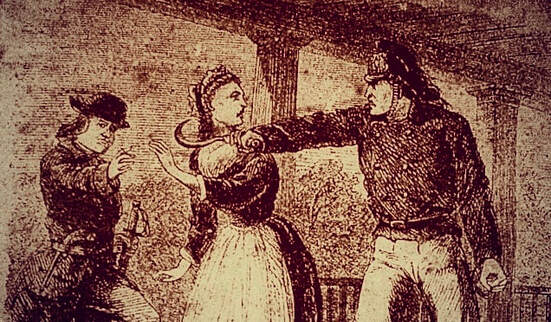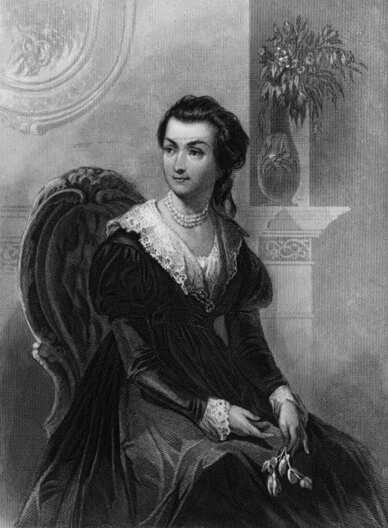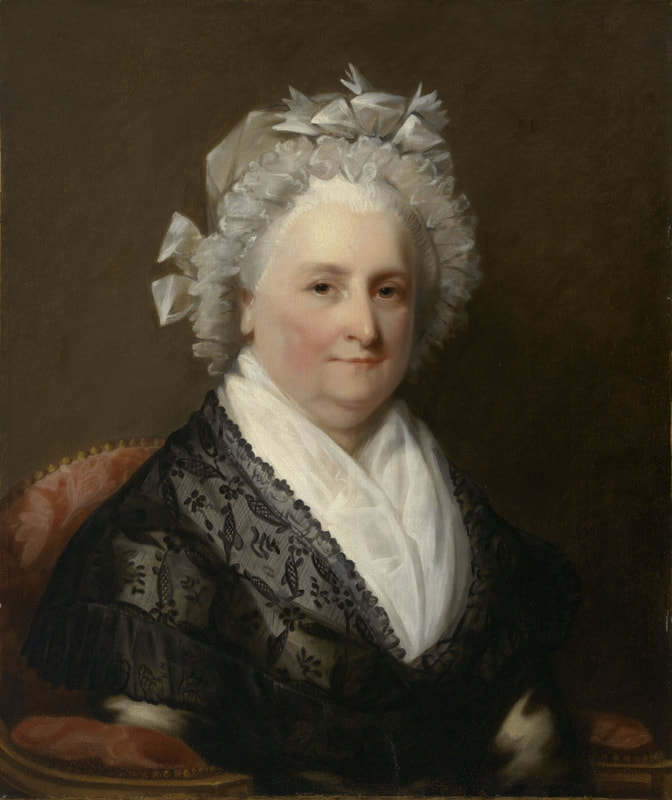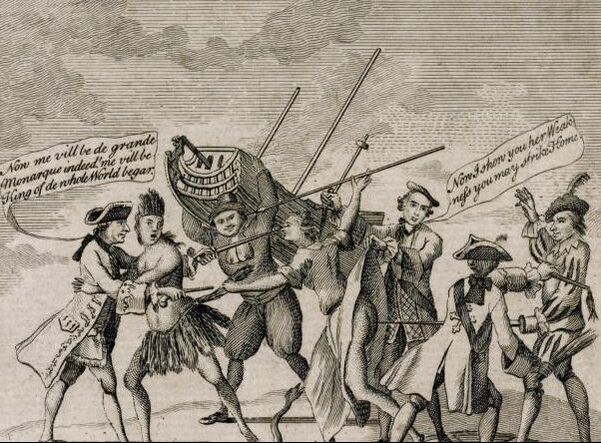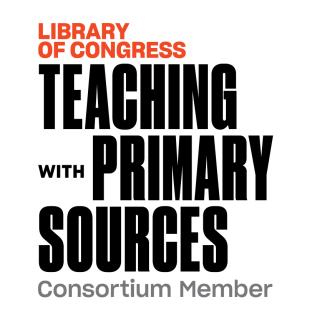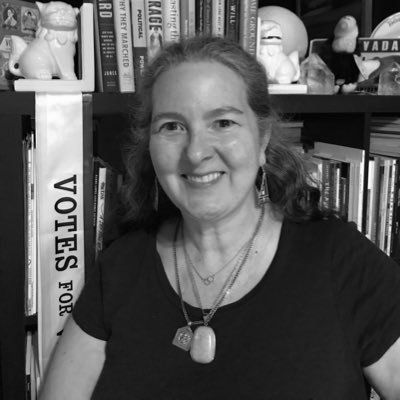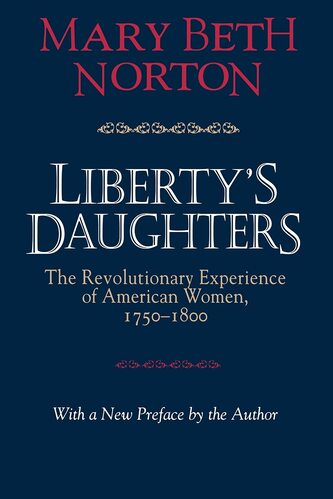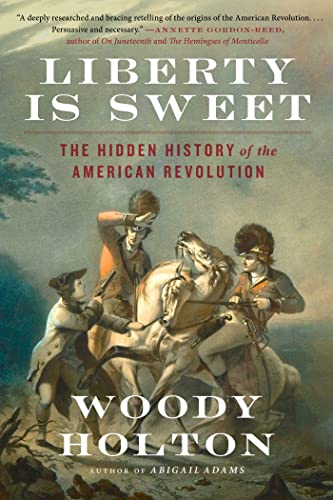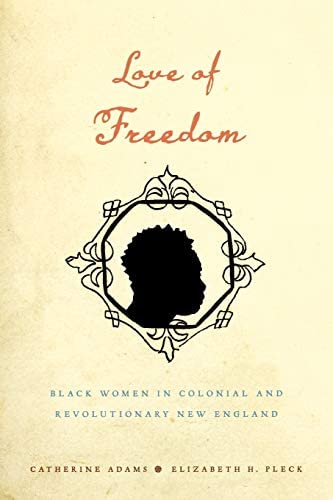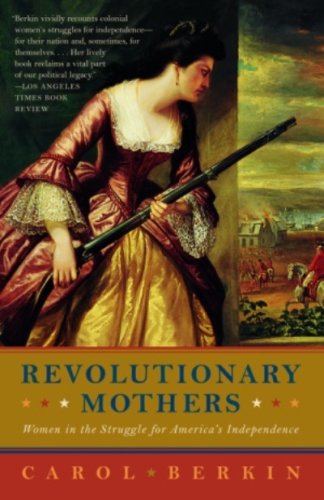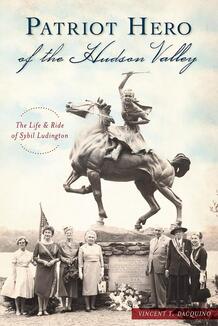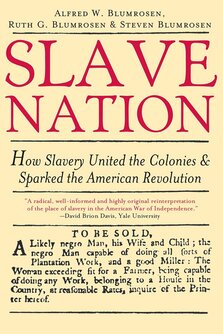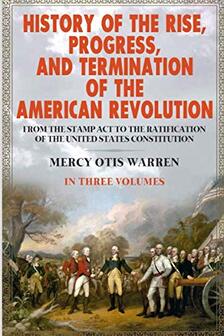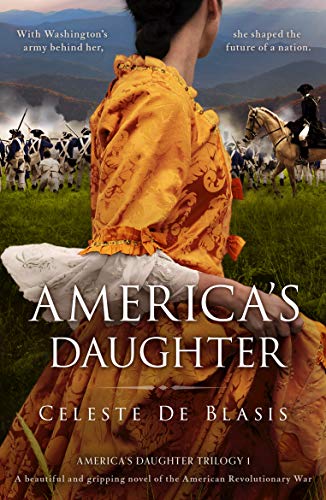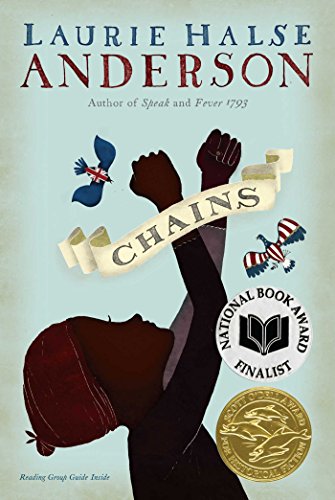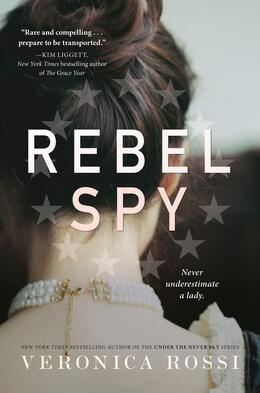4. Women's American Revolution
|
Women of all classes and races were not only supporters and opponents of the American Revolution, they actively promoted, engaged, wrote about, fought, and were deeply impacted by the outcome of the American Revolution. Their experiences were and perspectives were about as diverse as the women themselves.
Trigger Warning: for discussion of rape and sexual assault. |
|
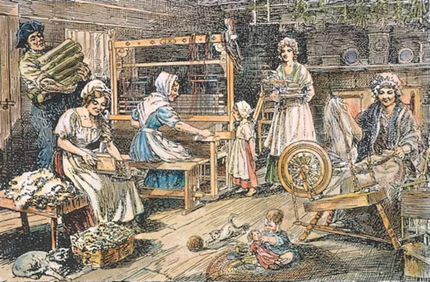 Public Domain
Public Domain
Mention of the American Revolution evokes images of George Washington, Samuel Adams and the Sons of Liberty, Benjamin Franklin, John Adams, and even Benedict Arnold long before it conjures up images of Deborah Sampson, Abigail Adams, or Mercy Otis Warren. While the leading figures of the Revolution became known as the Founding Fathers, history tends to ignore the Founding Mothers who fought right alongside them.
The American Revolution began in the wake of the Seven Years War, which ended in 1763. After 150 years of colonial growth, distance started to drive a wedge between the colonies and their mother country. Despite ample raw materials, increasing wealth, and a growing healthy population the English continued to treat Americans as second-class citizens. Though the colonists had been treated as equals during the Seven Years War, and had even felt more connected to their English roots because of the war, once the war ended, the English reverted to regarding the American colonists as subordinate and secondary. This was soon exacerbated by British efforts to control American trade, implement restrictions on settling Native lands, and taxation without representation in Parliament. As the various male-centric dissenters around the colonies slowly congregated into groups like the Sons of Liberty, and organized resistance, history seems to suggest that women retreated into the shadows.
The American Revolution began in the wake of the Seven Years War, which ended in 1763. After 150 years of colonial growth, distance started to drive a wedge between the colonies and their mother country. Despite ample raw materials, increasing wealth, and a growing healthy population the English continued to treat Americans as second-class citizens. Though the colonists had been treated as equals during the Seven Years War, and had even felt more connected to their English roots because of the war, once the war ended, the English reverted to regarding the American colonists as subordinate and secondary. This was soon exacerbated by British efforts to control American trade, implement restrictions on settling Native lands, and taxation without representation in Parliament. As the various male-centric dissenters around the colonies slowly congregated into groups like the Sons of Liberty, and organized resistance, history seems to suggest that women retreated into the shadows.
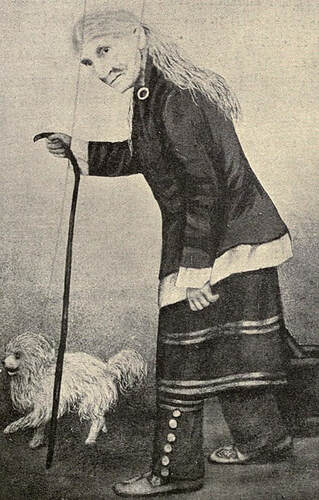 1892 Depiction of Jemison, Wikimedia Commons
1892 Depiction of Jemison, Wikimedia Commons
French and Indian War:
The American Revolution has its origins in the French and Indian War, also known as the Seven Years war in Europe. This war began over efforts to control the Ohio River Valley, the “frontier” at the time. West of the English colonies was a multicultural continent of French, Dutch, and English settlers and the Indigenous people whose ancestors had long inhabited these lands. The region was home to various Indigenous groups such as the Haudenosaunee, Wendat, Myaamia, Ho Chunk, Odawa, Potawatomi, Illinois, Meskwaki, Sauk, and others, each with distinct cultures and lifestyles. The mix of people from such diverse backgrounds, all claiming parts of the land in the Ohio River Valley for themselves, was bound to lead to tension. Some people, many times women, were caught bridging the gap between the French and Native communities, sometimes by force.
Women played a crucial role in the development and survival of frontier communities, often taking on multiple responsibilities. Women on the frontier were expected to contribute to the physical labor necessary for survival. They helped clear land, build houses and shelters, tend livestock, plant and harvest crops, fetch water, and gather firewood. These tasks required significant physical strength and endurance.
Frontier communities were closely-knit, and women played a crucial role in providing support to one another. They formed networks and cooperated with other women to share resources, knowledge, and childcare responsibilities. These relationships provided a sense of community and mutual assistance in the face of hardships.
In 1703, Esther Wheelwright lived with her family on the border of New France in a small Puritan, fur trading village. Esther was captured by Wabanaki and French forces retaliating for English encroachment on their land. In captivity, she was adopted by a Wabanaki family before being introduced to Catholicism by some French priests and eventually became a nun.
Marguerite Faffart was a métis, or mixed race, woman who lived in modern day Detroit. She was the daughter of a French trader and a French-Algonquin mother. Faffart was married to an abusive man who beat her and their young child. She fled to Pennsylvania where she was able to reconnect with her Algonquin family. Known as "French Margaret" among her British neighbors, she utilized her kinship and trade networks to sustain herself and her son through fur trading. At some point before 1735, she married Katarioniecha, a Mohawk man from Caughnawaga, thereby becoming part of another Native community and expanding her networks into the New York colony. Marguerite and Katarioniecha had four children.
In 1737, Faffart’s first husband died, leaving her a huge inheritance. She never returned to claim it, but her sister and brother-in-law fought for her in the Detroit courts. They won based on numerous witnesses to her husband's abuse– a rare court victory for women.
Tensions between powers on the frontier came to a head in the French and Indian war which officially began in 1756. The British wanted to secure control of the frontier. Indigenous people wanted their lands back, and the French wanted more control of the fur trade without British intervention.
During the French and Indian War, women played a crucial role in supporting the war effort and maintaining daily life on the homefront. They were responsible for managing households, ensuring the well-being of their families, and providing sustenance for both civilians and soldiers. Women worked tirelessly to maintain farms, produce essential goods, and care for the wounded. Their contributions to the logistical aspects of the war often went unrecognized, yet they played a vital role in sustaining the colonial forces.
Many women accompanied their husbands or male relatives to the front lines, providing nursing care, cooking, and even participating in combat when necessary. Some women took up arms themselves, disguising their gender to join the fight. These brave individuals defied societal norms and risked their lives for their cause, showing that gender did not restrict their dedication and bravery.
Women had access to critical information through their social networks and were able to gather intelligence and relay it to military leaders. Their abilities to navigate social circles and gather valuable data often proved instrumental in shaping military strategies and securing victories. Mary Jemison was a woman who profoundly influenced the course of the French and Indian War. Born in 1743 in Pennsylvania, Jemison was captured by a Shawnee war party during the conflict. Renamed Dehgewanus by the Seneca tribe, Jemison chose to assimilate into their society, learning their language, adopting their customs, and eventually marrying a Seneca man. Her intimate knowledge of both Native American and European cultures made her an invaluable resource for the Seneca tribe and the British forces.
Jemison's unique position allowed her to act as a mediator between the Seneca and the British, facilitating communication and negotiation. Her insights into the tactics, strategies, and intentions of the Native American tribes, as well as her familiarity with European military practices, proved invaluable to British military leaders. Jemison's efforts helped to establish trust, foster alliances, and ultimately shape the outcome of the war in favor of the British.
So why did a British victory lead the British colonists to rebel? There are a few reasons. The conclusion of the war coincided with a Proclamation that barred the settlers from further expansion west in an attempt to pacify indigenous people who faced encroachment. Since the English were able to oust the French from the disputed territory in the Ohio River Valley, the proclamation line alienated the English colonists who wanted to continue moving west. The French and Indian War was also incredibly expensive. Because the war cost the English lots of money and King George felt the colonists should be forced to pay for it. Colonists were taxed first through the Sugar Act of 1764. Its primary purpose was to raise revenue by imposing duties on sugar and other goods imported into the American colonies. The act replaced the earlier Molasses Act of 1733, which had been largely ineffective in curbing smuggling.
Under the Sugar Act, the duties on molasses were lowered, but stricter enforcement measures were implemented to crack down on smuggling. In other words, even though, on paper, the tax was lowered, enhanced anti-smuggling provisions meant that colonists were essentially paying this (lower) tax for the first time. Additionally, new duties were imposed on other goods like wine, coffee, textiles, and indigo. Collectively, these new taxes directly impacted the homes of women trying to provide for their families.
Additionally, the Stamp Act was passed by the British Parliament in March 1765. It was an internal tax that required the purchase of stamps for a wide range of paper goods, including legal documents, newspapers, pamphlets, playing cards, and even dice. The stamps had to be affixed to the designated items as proof of payment.
The Stamp Act was particularly controversial as it directly affected many colonists, including lawyers, printers, merchants, and the general public–particularly in areas where literacy rates were high. The act was met with widespread resistance in the American colonies, as it was seen as a direct infringement on their rights, without proper representation in the British government. The opposition eventually led to organized protests, boycotts, and the formation of the Stamp Act Congress, which called for the repeal of the Act.
The American Revolution has its origins in the French and Indian War, also known as the Seven Years war in Europe. This war began over efforts to control the Ohio River Valley, the “frontier” at the time. West of the English colonies was a multicultural continent of French, Dutch, and English settlers and the Indigenous people whose ancestors had long inhabited these lands. The region was home to various Indigenous groups such as the Haudenosaunee, Wendat, Myaamia, Ho Chunk, Odawa, Potawatomi, Illinois, Meskwaki, Sauk, and others, each with distinct cultures and lifestyles. The mix of people from such diverse backgrounds, all claiming parts of the land in the Ohio River Valley for themselves, was bound to lead to tension. Some people, many times women, were caught bridging the gap between the French and Native communities, sometimes by force.
Women played a crucial role in the development and survival of frontier communities, often taking on multiple responsibilities. Women on the frontier were expected to contribute to the physical labor necessary for survival. They helped clear land, build houses and shelters, tend livestock, plant and harvest crops, fetch water, and gather firewood. These tasks required significant physical strength and endurance.
Frontier communities were closely-knit, and women played a crucial role in providing support to one another. They formed networks and cooperated with other women to share resources, knowledge, and childcare responsibilities. These relationships provided a sense of community and mutual assistance in the face of hardships.
In 1703, Esther Wheelwright lived with her family on the border of New France in a small Puritan, fur trading village. Esther was captured by Wabanaki and French forces retaliating for English encroachment on their land. In captivity, she was adopted by a Wabanaki family before being introduced to Catholicism by some French priests and eventually became a nun.
Marguerite Faffart was a métis, or mixed race, woman who lived in modern day Detroit. She was the daughter of a French trader and a French-Algonquin mother. Faffart was married to an abusive man who beat her and their young child. She fled to Pennsylvania where she was able to reconnect with her Algonquin family. Known as "French Margaret" among her British neighbors, she utilized her kinship and trade networks to sustain herself and her son through fur trading. At some point before 1735, she married Katarioniecha, a Mohawk man from Caughnawaga, thereby becoming part of another Native community and expanding her networks into the New York colony. Marguerite and Katarioniecha had four children.
In 1737, Faffart’s first husband died, leaving her a huge inheritance. She never returned to claim it, but her sister and brother-in-law fought for her in the Detroit courts. They won based on numerous witnesses to her husband's abuse– a rare court victory for women.
Tensions between powers on the frontier came to a head in the French and Indian war which officially began in 1756. The British wanted to secure control of the frontier. Indigenous people wanted their lands back, and the French wanted more control of the fur trade without British intervention.
During the French and Indian War, women played a crucial role in supporting the war effort and maintaining daily life on the homefront. They were responsible for managing households, ensuring the well-being of their families, and providing sustenance for both civilians and soldiers. Women worked tirelessly to maintain farms, produce essential goods, and care for the wounded. Their contributions to the logistical aspects of the war often went unrecognized, yet they played a vital role in sustaining the colonial forces.
Many women accompanied their husbands or male relatives to the front lines, providing nursing care, cooking, and even participating in combat when necessary. Some women took up arms themselves, disguising their gender to join the fight. These brave individuals defied societal norms and risked their lives for their cause, showing that gender did not restrict their dedication and bravery.
Women had access to critical information through their social networks and were able to gather intelligence and relay it to military leaders. Their abilities to navigate social circles and gather valuable data often proved instrumental in shaping military strategies and securing victories. Mary Jemison was a woman who profoundly influenced the course of the French and Indian War. Born in 1743 in Pennsylvania, Jemison was captured by a Shawnee war party during the conflict. Renamed Dehgewanus by the Seneca tribe, Jemison chose to assimilate into their society, learning their language, adopting their customs, and eventually marrying a Seneca man. Her intimate knowledge of both Native American and European cultures made her an invaluable resource for the Seneca tribe and the British forces.
Jemison's unique position allowed her to act as a mediator between the Seneca and the British, facilitating communication and negotiation. Her insights into the tactics, strategies, and intentions of the Native American tribes, as well as her familiarity with European military practices, proved invaluable to British military leaders. Jemison's efforts helped to establish trust, foster alliances, and ultimately shape the outcome of the war in favor of the British.
So why did a British victory lead the British colonists to rebel? There are a few reasons. The conclusion of the war coincided with a Proclamation that barred the settlers from further expansion west in an attempt to pacify indigenous people who faced encroachment. Since the English were able to oust the French from the disputed territory in the Ohio River Valley, the proclamation line alienated the English colonists who wanted to continue moving west. The French and Indian War was also incredibly expensive. Because the war cost the English lots of money and King George felt the colonists should be forced to pay for it. Colonists were taxed first through the Sugar Act of 1764. Its primary purpose was to raise revenue by imposing duties on sugar and other goods imported into the American colonies. The act replaced the earlier Molasses Act of 1733, which had been largely ineffective in curbing smuggling.
Under the Sugar Act, the duties on molasses were lowered, but stricter enforcement measures were implemented to crack down on smuggling. In other words, even though, on paper, the tax was lowered, enhanced anti-smuggling provisions meant that colonists were essentially paying this (lower) tax for the first time. Additionally, new duties were imposed on other goods like wine, coffee, textiles, and indigo. Collectively, these new taxes directly impacted the homes of women trying to provide for their families.
Additionally, the Stamp Act was passed by the British Parliament in March 1765. It was an internal tax that required the purchase of stamps for a wide range of paper goods, including legal documents, newspapers, pamphlets, playing cards, and even dice. The stamps had to be affixed to the designated items as proof of payment.
The Stamp Act was particularly controversial as it directly affected many colonists, including lawyers, printers, merchants, and the general public–particularly in areas where literacy rates were high. The act was met with widespread resistance in the American colonies, as it was seen as a direct infringement on their rights, without proper representation in the British government. The opposition eventually led to organized protests, boycotts, and the formation of the Stamp Act Congress, which called for the repeal of the Act.
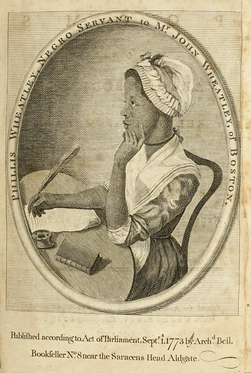 Phyllis Wheatley, Library of Congress
Phyllis Wheatley, Library of Congress
Women were involved in resistance from the very beginning. Women ran taverns which provided a safe place for rebels to meet, discuss ideas, and plan their protests. Women were also immediately recruited by the Sons of Liberty and others to serve as spies as tensions mounted closer to war. Seamstresses, servants, laundresses, and caregivers in the homes of loyalists and British officials were called on to provide information that proved critical to protecting rebels from the earliest protests through the greatest battles of the war.
We also cannot deny that many Americans opposed the rebellion, and many loyalist women sought to support the war effort on the British side as well. Women were at the forefront of defining what America was, and what it meant to be included among her people. Phillis Wheatley became the first African American author of published poetry in 1773, which eventually led to her emancipation from slavery. She would write controversial poems challenging the system of slavery, poems commending George Washington, and during the rebellion, described the dissolving relationship between mother country and her colonies:
“A certain lady had an only son
He grew up daily virtuous as he grew
Fearing his Strength which she undoubted knew
She laid some taxes on her darling son
And would have laid another act there on
Amend your manners I’ll the task remove
Was said with seeming Sympathy and Love
By many Scourges she his goodness try’d”
In other words, Britain was saying “I’m doing this for you,” but deep down, she was continuing to test American’s good nature.
We also cannot deny that many Americans opposed the rebellion, and many loyalist women sought to support the war effort on the British side as well. Women were at the forefront of defining what America was, and what it meant to be included among her people. Phillis Wheatley became the first African American author of published poetry in 1773, which eventually led to her emancipation from slavery. She would write controversial poems challenging the system of slavery, poems commending George Washington, and during the rebellion, described the dissolving relationship between mother country and her colonies:
“A certain lady had an only son
He grew up daily virtuous as he grew
Fearing his Strength which she undoubted knew
She laid some taxes on her darling son
And would have laid another act there on
Amend your manners I’ll the task remove
Was said with seeming Sympathy and Love
By many Scourges she his goodness try’d”
In other words, Britain was saying “I’m doing this for you,” but deep down, she was continuing to test American’s good nature.
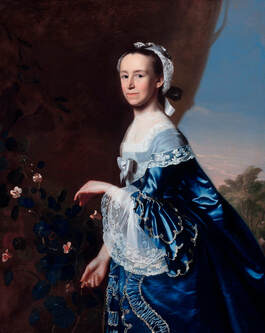 Mercy Otis Warren, Library of Congress
Mercy Otis Warren, Library of Congress
Likewise, Mercy Otis Warren was an outspoken patriot. Having been surrounded by politics her whole life, she regularly debated political leaders and wrote several plays calling out the wrongdoings of Britain and their royal officials years before the war broke out. She was willing to say “independence” far before the male representatives of her time and was brazen in her literary assault on the King. She was also unafraid to criticize military officers and the Continental Congress during the war. She seemed unafraid to take on anyone, as she wrote, “Great advantages are often attended with great inconveniences, and great minds called to severe trials.” She would also go on to write and publish the first history of the Revolution, the first nonfiction book published by a woman in America.
The intellectual pursuits of these women and the ideas they presented were not only important leading up to the war and throughout the conflict, but they also raised questions about women’s rights.
The intellectual pursuits of these women and the ideas they presented were not only important leading up to the war and throughout the conflict, but they also raised questions about women’s rights.
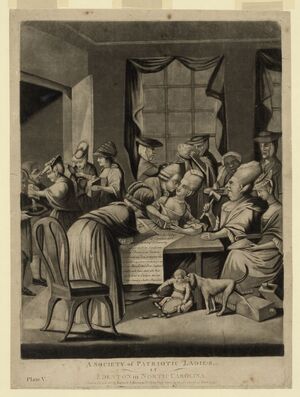 A Society of Patriotic Ladies (notice the dog), Library of Congress
A Society of Patriotic Ladies (notice the dog), Library of Congress
Some women bonded together to match their written words with action. Society at the time did not expect, or often allow, women to play a prominent role in these more direct forms of protest. Instead, they were called on to take more dignified paths. Penelope Barker and over fifty women from the city of Edenton, North Carolina, would do exactly that. They would mail a letter signed by each of their party indicating that they would boycott British tea and cloth until a resolution was reached between Parliament and the newly formed Continental Congress.
The British press had a good laugh at these patriotic ladies, but the Virginia Gazette heaped on the praise. While this event would not receive the historic attention of the Boston Tea Party, these women gathered to voice their concerns to Parliament.
When Americans were called upon to start boycotting British goods, women stepped in to produce these goods.. Daughters of Liberty groups gathered to spin wool to make their own textiles (where we get the term “home-spun”). They learned to make tea with American herbs, which they called Liberty Tea. Also, doing the majority of the shopping for their home, they held up the mantle of boycotting British manufactured goods as well. Even popular culture at the time understood women’s vital role in economic boycotts. A popular song before the American Revolution was improvised to explain the importance of homespun–not imported–textiles and goods. Several versions of the song exist, but most of them highlight how it was patriotic for women to wear homespun goods. It’s a bit ironic that the song would say “No more ribbands wear, nor in rich dress appear/Love your country much better than fine things.” On one hand, the song is appealing to women’s sense of patriotism in America–a place where they are not considered citizens. At the same time, the song later reassures women that they will still be found attractive–which also suggests perhaps that the songwriter believes American women are apolitical and only interested in fashion and beauty. Either way, what is clear is that women’s participation in these boycotts constituted political action.
We also can’t forget that women were used as pawns in war too. Namely, they became propaganda. This happens regularly throughout periods of war, where societies paint a message of men needing to protect women from their enemy.
The British press had a good laugh at these patriotic ladies, but the Virginia Gazette heaped on the praise. While this event would not receive the historic attention of the Boston Tea Party, these women gathered to voice their concerns to Parliament.
When Americans were called upon to start boycotting British goods, women stepped in to produce these goods.. Daughters of Liberty groups gathered to spin wool to make their own textiles (where we get the term “home-spun”). They learned to make tea with American herbs, which they called Liberty Tea. Also, doing the majority of the shopping for their home, they held up the mantle of boycotting British manufactured goods as well. Even popular culture at the time understood women’s vital role in economic boycotts. A popular song before the American Revolution was improvised to explain the importance of homespun–not imported–textiles and goods. Several versions of the song exist, but most of them highlight how it was patriotic for women to wear homespun goods. It’s a bit ironic that the song would say “No more ribbands wear, nor in rich dress appear/Love your country much better than fine things.” On one hand, the song is appealing to women’s sense of patriotism in America–a place where they are not considered citizens. At the same time, the song later reassures women that they will still be found attractive–which also suggests perhaps that the songwriter believes American women are apolitical and only interested in fashion and beauty. Either way, what is clear is that women’s participation in these boycotts constituted political action.
We also can’t forget that women were used as pawns in war too. Namely, they became propaganda. This happens regularly throughout periods of war, where societies paint a message of men needing to protect women from their enemy.
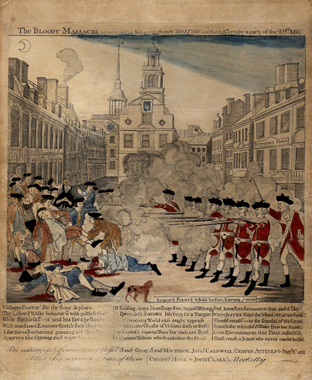 Paul Revere's propaganda using women to gain sympathy, Library of Congress
Paul Revere's propaganda using women to gain sympathy, Library of Congress
We can see this early in the Revolution. In the days after the Boston Massacre in 1770, Paul Revere and Henry Pelham’s engraving of the event spread far and wide through colonial newspapers. There are many, many inaccuracies of the image, each was hand-picked to spread a message about America’s innocence in the event.
The British soldiers appear to be firing into a completely unassuming crowd. The figure of the woman standing clearly in the midst of the crowd was not meant to show that women were involved in the scuffle that made the Revolution inevitable, but rather to make America seem to be the undeniable victims. Presumably, the presence of a woman in the protest would have ensured that it was peaceful and respectful, while her presence also suggested that the British’s actions were especially depraved.
Fighting eventually broke out at Lexington and Concord and around the English colonies. Sybil Ludington, a sixteen year old girl, took a ride just as daring as Paul Revere’s and more than double the distance, to warn the militias of New York and Connecticut that British invaders were on their way. After the war, General George Washington personally thanked her for her service.
The British soldiers appear to be firing into a completely unassuming crowd. The figure of the woman standing clearly in the midst of the crowd was not meant to show that women were involved in the scuffle that made the Revolution inevitable, but rather to make America seem to be the undeniable victims. Presumably, the presence of a woman in the protest would have ensured that it was peaceful and respectful, while her presence also suggested that the British’s actions were especially depraved.
Fighting eventually broke out at Lexington and Concord and around the English colonies. Sybil Ludington, a sixteen year old girl, took a ride just as daring as Paul Revere’s and more than double the distance, to warn the militias of New York and Connecticut that British invaders were on their way. After the war, General George Washington personally thanked her for her service.
As men joined militias and headed off to war, gender norms were disrupted and women assumed responsibilities managing businesses and farms. This also left some women vulnerable. A South Carolina woman, Eliza Pickney, described her situation, “my property pulled into pieces, burnt and destroyed; my money of no value, my Children sick and prisoners.” Women were also attacked and raped at home by Tory and British soldiers as they came through.
The home front was dangerous for women, but many women did not despair. Abigail Adams wrote, “We possess a spirit that will not be conquered. If our Men are drawn off and we should be attacked, you will find a Race of Amazons in America.” She turned her home into a hospital during the war and did whatever she could to keep up morale at home.
The home front was dangerous for women, but many women did not despair. Abigail Adams wrote, “We possess a spirit that will not be conquered. If our Men are drawn off and we should be attacked, you will find a Race of Amazons in America.” She turned her home into a hospital during the war and did whatever she could to keep up morale at home.
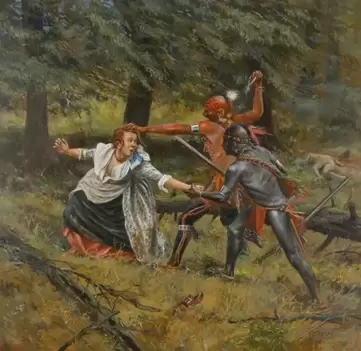 Jane McCrea's Death, Public Domain
Jane McCrea's Death, Public Domain
Martha Washington was a wealthy woman, inheriting a great deal of money from her first husband. During the war, she maintained her elaborate estates and bankrolled the war effort. Every winter, when the war was stalemated, she would travel, like a lot of wives would, to be with Washington in the camps. Washington and other prominent women began a campaign to America's women to collect direct aid for soldiers in the Continental Army. Mount Vernon records show that Martha herself donated $20,000.
As the British stomped their way through upstate New York, young Jane McCrea, met her untimely end. Engaged to a loyalist officer who had rushed off to serve, McCrea was making her way toward him when she was abducted and killed. While there is much debate about her killers, the blame was placed on General John Burgoyne’s Native scouts. Jane became a tool for the Patriots.
The message was spread among the communities that Jane had been one of their own. If Burgoyne would allow that to happen and let her killers go unpunished, to a loyalist woman, moreover one of his own officer’s fiancés, what would he do to your wife, fiancé, daughter, or sister, when he came through?
This takes a political war into the realm of a moral or ethical one. The women needed protection from the British brute!
As the British stomped their way through upstate New York, young Jane McCrea, met her untimely end. Engaged to a loyalist officer who had rushed off to serve, McCrea was making her way toward him when she was abducted and killed. While there is much debate about her killers, the blame was placed on General John Burgoyne’s Native scouts. Jane became a tool for the Patriots.
The message was spread among the communities that Jane had been one of their own. If Burgoyne would allow that to happen and let her killers go unpunished, to a loyalist woman, moreover one of his own officer’s fiancés, what would he do to your wife, fiancé, daughter, or sister, when he came through?
This takes a political war into the realm of a moral or ethical one. The women needed protection from the British brute!
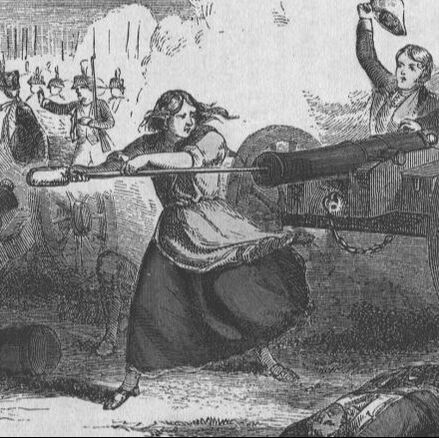 Molly Pitcher, Library of Congress
Molly Pitcher, Library of Congress
Molly Pitcher:
Let’s also remember that women were certainly not absent from the war itself. We’ve already discussed their roles as spies, and very often, the wives of officers and some women looking for work traveled with the army, known as “camp followers”. They cooked, cleaned, and cared for the men. They were often kept far to the rear to protect them from the battlefield, but this doesn’t mean they always stayed there.
Molly Pitcher was one such camp follower who is famed for having operated a cannon in the place of her husband, who was killed in the line of duty.
Some mystery sounds the story of Molly Pitcher. Many claim it was Mary Hays, who was a camp follower of her husband William. She stayed with him at Valley Forge, and in the summer after, was with him at the Battle of Monmouth Courthouse. When he died, she had been delivering pitchers of water to the men, and immediately jumped in his place. She took on the role of swabbing and reloading the cannon, supposedly even earning Washington’s attention.
Others claim this was really Molly Corbin at Fort Washington, where she, like Hays, stepped into her husband’s place fighting against the attacking Hessians until she was wounded in the arm. She was awarded a monthly pension from the state of Pennsylvania for her heroism; the first American woman to be awarded such a military honor.
As to who the real “Molly Pitcher” is, we can only guess. These two women are the best recognized, but likely dozens of women took on similar positions at some point in the war. The legend really became a composite of all of them. Thus, Molly Pitcher is just a singular figure that is meant to represent multiple women who took on the British in the heat of battle.
Let’s also remember that women were certainly not absent from the war itself. We’ve already discussed their roles as spies, and very often, the wives of officers and some women looking for work traveled with the army, known as “camp followers”. They cooked, cleaned, and cared for the men. They were often kept far to the rear to protect them from the battlefield, but this doesn’t mean they always stayed there.
Molly Pitcher was one such camp follower who is famed for having operated a cannon in the place of her husband, who was killed in the line of duty.
Some mystery sounds the story of Molly Pitcher. Many claim it was Mary Hays, who was a camp follower of her husband William. She stayed with him at Valley Forge, and in the summer after, was with him at the Battle of Monmouth Courthouse. When he died, she had been delivering pitchers of water to the men, and immediately jumped in his place. She took on the role of swabbing and reloading the cannon, supposedly even earning Washington’s attention.
Others claim this was really Molly Corbin at Fort Washington, where she, like Hays, stepped into her husband’s place fighting against the attacking Hessians until she was wounded in the arm. She was awarded a monthly pension from the state of Pennsylvania for her heroism; the first American woman to be awarded such a military honor.
As to who the real “Molly Pitcher” is, we can only guess. These two women are the best recognized, but likely dozens of women took on similar positions at some point in the war. The legend really became a composite of all of them. Thus, Molly Pitcher is just a singular figure that is meant to represent multiple women who took on the British in the heat of battle.
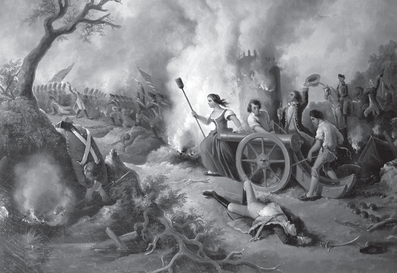 Molly Pitcher, Library of Congress
Molly Pitcher, Library of Congress
Mammy Kate was an enslaved woman who worked on Stephen Heard’s, the future Governor of Georgia, plantation. When he was captured and held prisoner during the American Revolution, Mammy Kate infiltrated and smuggled him out. She was the first Black woman to be honored as a patriot of the American Revolution in the state of Georgia.
Then, there is Deborah Sampson Gannett.
Sampson was born into poverty, and struggled through most of her early life, serving as an indentured servant, teacher, weaver, and more. The Revolutionary War raged through her late teens, and at twenty-one, in the war’s waning years, she jumped at the opportunity for regular pay. She joined a Massachusetts regiment under the alias of Robert Shurtleff, not only a scandalous move, but an illegal one given Massachusetts laws against women dressing as men.
She was ushered off to West Point where she served in the light infantry, constantly on the move, scouting, and skirmishing. In one nasty engagement, she was slashed across the forehead with a saber, and shot twice in the leg. She let her forehead wound be tended to at a field hospital, and then ran back to her tent to dig out the two iron balls and stitch up her wounds herself to avoid being caught. She served for over a year and half before she was finally caught at the very end of the war. She would eventually successfully lobby for a federal soldier’s pension in return for her service.
Then, there is Deborah Sampson Gannett.
Sampson was born into poverty, and struggled through most of her early life, serving as an indentured servant, teacher, weaver, and more. The Revolutionary War raged through her late teens, and at twenty-one, in the war’s waning years, she jumped at the opportunity for regular pay. She joined a Massachusetts regiment under the alias of Robert Shurtleff, not only a scandalous move, but an illegal one given Massachusetts laws against women dressing as men.
She was ushered off to West Point where she served in the light infantry, constantly on the move, scouting, and skirmishing. In one nasty engagement, she was slashed across the forehead with a saber, and shot twice in the leg. She let her forehead wound be tended to at a field hospital, and then ran back to her tent to dig out the two iron balls and stitch up her wounds herself to avoid being caught. She served for over a year and half before she was finally caught at the very end of the war. She would eventually successfully lobby for a federal soldier’s pension in return for her service.
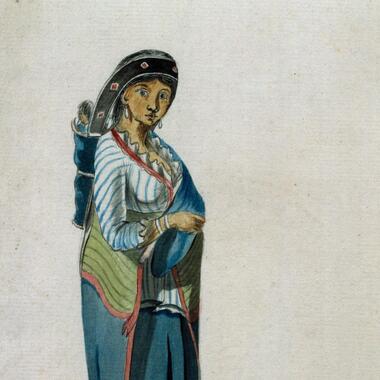 Madam Sacho, Public Domain
Madam Sacho, Public Domain
Native Americans:
For Native Americans the war was incredibly complicated. They had to hedge their bets on which side they believed would have favorable policies towards them following the war. The British had an advantage as their policies limiting white encroachment on Native lands were one of the catalysts for war. But some nations did side with the Patriots.
The war split up the Iroquois, or Haudenosaunee , Confederacy. Haudenosaunee women played a deciding role in issues of war, peace, captivity, and death. One French man declared, “it is the women who really make up the Nation. . . . All the real authority rests in the women.”
Most of the Confederacy sided with the British but had little interest in joining what they saw as a family affair between Europeans. Konwat-sits-ia-ienni, or Molly Brant urged her nation to support the British cause, resulting in a series of raids in New York that hurt the Patriots. Haudenosaunee warriors attacked settlements, killing men, women and children, in retaliation for ill treatment. One Patriot captain wrote, “Such a shocking sight my eyes never held before of savage and brutal barbarity; to see the husband mourning over his dead wife and four dead children lying by her side, mangled, scalpt.”
In retaliation, General Washington planned to raid Native villages stealing away the women and luring the warriors out. They employed scorched earth warfare tactics setting afire crops, fruit trees, and longhouses. Women, children, and the elderly were murdered.
But when they came to one village they found it abandoned save for an old woman known as Madam Sacho. The woman reported to them that her people had debated whether to surrender, and decided not to. It’s possible her age garnered some of the soldiers’ sympathy. It’s also possible she was incredibly wise, but the soldiers left her alive. When they came back through, another Native woman was found dead, shot and probably raped by Patriot soldiers.
Why was Madam Sacho left alone in her village when the rest of the community departed? Where did the rest of her village go? Soldiers couldn’t track them. Did Madam Sacho give him bad information to give her people more time to get away? And why was the young woman who returned to care for Madam Sacho murdered?
For Native Americans the war was incredibly complicated. They had to hedge their bets on which side they believed would have favorable policies towards them following the war. The British had an advantage as their policies limiting white encroachment on Native lands were one of the catalysts for war. But some nations did side with the Patriots.
The war split up the Iroquois, or Haudenosaunee , Confederacy. Haudenosaunee women played a deciding role in issues of war, peace, captivity, and death. One French man declared, “it is the women who really make up the Nation. . . . All the real authority rests in the women.”
Most of the Confederacy sided with the British but had little interest in joining what they saw as a family affair between Europeans. Konwat-sits-ia-ienni, or Molly Brant urged her nation to support the British cause, resulting in a series of raids in New York that hurt the Patriots. Haudenosaunee warriors attacked settlements, killing men, women and children, in retaliation for ill treatment. One Patriot captain wrote, “Such a shocking sight my eyes never held before of savage and brutal barbarity; to see the husband mourning over his dead wife and four dead children lying by her side, mangled, scalpt.”
In retaliation, General Washington planned to raid Native villages stealing away the women and luring the warriors out. They employed scorched earth warfare tactics setting afire crops, fruit trees, and longhouses. Women, children, and the elderly were murdered.
But when they came to one village they found it abandoned save for an old woman known as Madam Sacho. The woman reported to them that her people had debated whether to surrender, and decided not to. It’s possible her age garnered some of the soldiers’ sympathy. It’s also possible she was incredibly wise, but the soldiers left her alive. When they came back through, another Native woman was found dead, shot and probably raped by Patriot soldiers.
Why was Madam Sacho left alone in her village when the rest of the community departed? Where did the rest of her village go? Soldiers couldn’t track them. Did Madam Sacho give him bad information to give her people more time to get away? And why was the young woman who returned to care for Madam Sacho murdered?
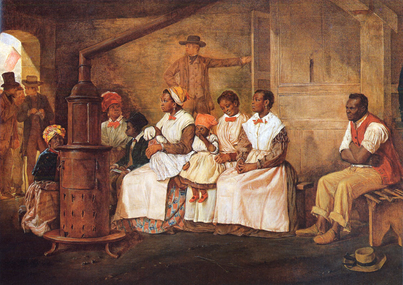 Enslaved women with their children, Public Domain
Enslaved women with their children, Public Domain
Enslaved Women:
For enslaved Americans the Revolution presented a potential opportunity and they took advantage of it. They fought for both sides, whichever would ensure their freedom. The Virginia Governor issued Dunmore’s Proclamation guaranteeing freedom to any enslaved person who abandoned their Patriot owners and aided the British cause. Although the proclamation only applied to Virginia, it was printed throughout the colonies. In 1777, Vermont became the first colony to abolish slavery, providing safe haven for fugitive slaves.
Enslaved women’s desire for freedom for themselves and their children propelled them to flee from slavery during the Revolutionary War. The war disrupted the normal routine on plantations and lack of oversight allowed enslaved people to discuss freedom more seriously. One-third of all fugitives were enslaved women.
Margaret, Sarah, and Jenny were all enslaved women who fled bondage during the war. They knew they were worth more than the dollar amount put to them, what some referred to as their “Soul Value.”
Sarah was pregnant and ran away with her six-year old son. Her husband had joined the British Army and she intended to try and “pass” as free to join him. Jenny fled at eight months pregnant. Her enslaver advertised widely for her return. But Jenny had heard of Dunmore’s Proclamation and had spent months planning her escape. Enslaved women also made similar claims about their husbands being in the Continental Army. In a Runaway Slave advertisement in The New Jersey Gazette, one enslaver in 1778 offered compensation for the return of his runaway “Sarah.” He claimed the “mulatto” woman now called herself Rachael, and that she was “big with child” and had run off with her son, “a Mulatto boy named Bob, about six years old.” According to the advertisement, she had been last seen near “the first Maryland regiment, where she pretends to have a husband, with whom she has been the principal part of this compaign, and passed herself as a free woman.” These women knew that whatever the outcome of the war, their newborns would be enslaved and they couldn’t let that happen.
Elizabeth Freeman, or Mum Bett, was an enslaved woman in Massachusetts. Her husband died fighting the war. Throughout the war she had listened to the wealthy white people she served discuss concepts of freedom and liberty and decided this Enlightened philosophy should apply to her too. One day she was beaten by her mistress, which proved to be a catalyst to make demands. She fled, finding refuge with a white lawyer who helped her sue for her freedom.
For enslaved Americans the Revolution presented a potential opportunity and they took advantage of it. They fought for both sides, whichever would ensure their freedom. The Virginia Governor issued Dunmore’s Proclamation guaranteeing freedom to any enslaved person who abandoned their Patriot owners and aided the British cause. Although the proclamation only applied to Virginia, it was printed throughout the colonies. In 1777, Vermont became the first colony to abolish slavery, providing safe haven for fugitive slaves.
Enslaved women’s desire for freedom for themselves and their children propelled them to flee from slavery during the Revolutionary War. The war disrupted the normal routine on plantations and lack of oversight allowed enslaved people to discuss freedom more seriously. One-third of all fugitives were enslaved women.
Margaret, Sarah, and Jenny were all enslaved women who fled bondage during the war. They knew they were worth more than the dollar amount put to them, what some referred to as their “Soul Value.”
Sarah was pregnant and ran away with her six-year old son. Her husband had joined the British Army and she intended to try and “pass” as free to join him. Jenny fled at eight months pregnant. Her enslaver advertised widely for her return. But Jenny had heard of Dunmore’s Proclamation and had spent months planning her escape. Enslaved women also made similar claims about their husbands being in the Continental Army. In a Runaway Slave advertisement in The New Jersey Gazette, one enslaver in 1778 offered compensation for the return of his runaway “Sarah.” He claimed the “mulatto” woman now called herself Rachael, and that she was “big with child” and had run off with her son, “a Mulatto boy named Bob, about six years old.” According to the advertisement, she had been last seen near “the first Maryland regiment, where she pretends to have a husband, with whom she has been the principal part of this compaign, and passed herself as a free woman.” These women knew that whatever the outcome of the war, their newborns would be enslaved and they couldn’t let that happen.
Elizabeth Freeman, or Mum Bett, was an enslaved woman in Massachusetts. Her husband died fighting the war. Throughout the war she had listened to the wealthy white people she served discuss concepts of freedom and liberty and decided this Enlightened philosophy should apply to her too. One day she was beaten by her mistress, which proved to be a catalyst to make demands. She fled, finding refuge with a white lawyer who helped her sue for her freedom.
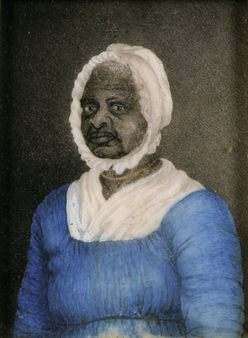 Elizabeth Freeman (Mum Bett), Library of Congress
Elizabeth Freeman (Mum Bett), Library of Congress
In Brom & Bett v. Ashley the jury ruled in her favor and ordered her former owners to pay her. Her case ultimately led to the abolition of slavery in Massachusetts just before the close of the American Revolution. Soon every northern state would abolish slavery; however, the abolition of slavery in the North was slow and gradual in order to mitigate the effects of the loss of property for the enslavers. As a result, the Revolution left a complicated legacy for Black people, as slavery still existed and persisted for decades in the North as it did in the South. Black women’s freedom cannot be disentangled from the story of American independence. These women monitored the war and were heavily affected by the outcome.
Revolutionary debates among white men about freedom and liberty absolutely included discussions of abolition, but they tabled the discussion for another generation – preferring union over freedom. How different might that discussion have been if women, all women, were included?
At least when Mum Bett died in 1829, she was a free woman. Her inspirational story didn’t end with her, though. One of her great-grandchildren was W.E.B. DuBois, the first Black man to graduate from Harvard and a founder of the NAACP.
Revolutionary debates among white men about freedom and liberty absolutely included discussions of abolition, but they tabled the discussion for another generation – preferring union over freedom. How different might that discussion have been if women, all women, were included?
At least when Mum Bett died in 1829, she was a free woman. Her inspirational story didn’t end with her, though. One of her great-grandchildren was W.E.B. DuBois, the first Black man to graduate from Harvard and a founder of the NAACP.
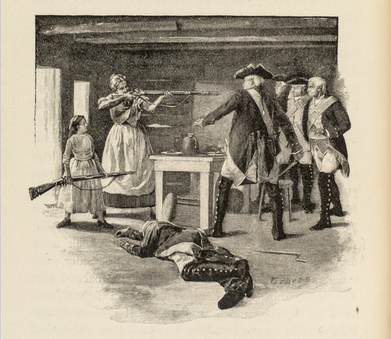 Nancy Hart, Library of Congress
Nancy Hart, Library of Congress
Revolutionary?:
Was the American Revolution truly revolutionary? Even white women were let down by limits of the Revolution’s revolutionary rhetoric. Maybe the most famous of Revolutionary women, Abigail Adams, wife of John Adams, was not only his closest advisor, but also one of the few women who became known as a founder of the nation. The letters they exchanged during his time in Congress, serving as a diplomat overseas, and even during the Constitutional Convention show his reliance on her advice and her contributions to major affairs. Most famously, during the Constitutional Convention, she would ask her husband and the other delegates to "remember the ladies, and be more generous and favorable to them than your ancestors. Do not put such unlimited power into the hands of the Husbands. Remember all Men would be tyrants if they could. If particular care and attention is not paid to the Ladies we are determined to foment a Rebellion, and will not hold ourselves bound by any Laws in which we have no voice, or Representation." In other words, she encouraged her husband to not create a government where women were ruled by their husbands as the patriots had been ruled by the King. Otherwise, the ladies will stand up for themselves, just the way Americans did against a government that didn’t represent them. John’s response was, “I cannot but laugh.” She would take her time in writing back and it would take over a century for her warned rebellion to happen, but the women of America held true to Abigail’s warning.
Was the American Revolution truly revolutionary? Even white women were let down by limits of the Revolution’s revolutionary rhetoric. Maybe the most famous of Revolutionary women, Abigail Adams, wife of John Adams, was not only his closest advisor, but also one of the few women who became known as a founder of the nation. The letters they exchanged during his time in Congress, serving as a diplomat overseas, and even during the Constitutional Convention show his reliance on her advice and her contributions to major affairs. Most famously, during the Constitutional Convention, she would ask her husband and the other delegates to "remember the ladies, and be more generous and favorable to them than your ancestors. Do not put such unlimited power into the hands of the Husbands. Remember all Men would be tyrants if they could. If particular care and attention is not paid to the Ladies we are determined to foment a Rebellion, and will not hold ourselves bound by any Laws in which we have no voice, or Representation." In other words, she encouraged her husband to not create a government where women were ruled by their husbands as the patriots had been ruled by the King. Otherwise, the ladies will stand up for themselves, just the way Americans did against a government that didn’t represent them. John’s response was, “I cannot but laugh.” She would take her time in writing back and it would take over a century for her warned rebellion to happen, but the women of America held true to Abigail’s warning.
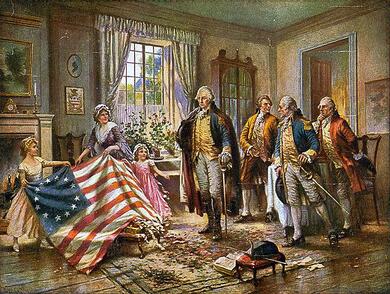 Library of Congress
Library of Congress
The Revolutionary War spread far beyond the battlefields, affecting the American people, their economy, and their lives in many unanticipated ways. The war would come to an end in the fall of 1783. While the men would be lauded for their efforts to bring America its independence, history quickly forgot the diverse women who also made that possible. The Sampsons and Pitchers on the battlefield; the Otis’, Adams’, and Wheatleys using their intellect, and the thousands of unnamed Native, Black, and rebel women serving as Daughters of Liberty, working behind the scenes as spies and soldiers, or those many uncelebrated women who kept their family farms, businesses, and trades alive while their husbands, fathers, and sons left for war.
This period is such an important part of American History, but women’s roles are often underrepresented in lieu of the images of tradesmen and farmers dropping the tools of the trade to fix bayonets and fight England. There is so much room for growth.What ways did women contribute to the rebellion and war effort? How are women’s contributions rewarded or ignored after the war’s conclusion? How did women’s roles inspire future generations in their pursuit of greater rights and recognition from the government they helped form?
This period is such an important part of American History, but women’s roles are often underrepresented in lieu of the images of tradesmen and farmers dropping the tools of the trade to fix bayonets and fight England. There is so much room for growth.What ways did women contribute to the rebellion and war effort? How are women’s contributions rewarded or ignored after the war’s conclusion? How did women’s roles inspire future generations in their pursuit of greater rights and recognition from the government they helped form?
Draw your own conclusions
|
Learn how to teach with inquiry.
Many of these lesson plans were sponsored in part by the Library of Congress Teaching with Primary Sources Eastern Region Program, coordinated by Waynesburg University, the History and Social Studies Education Faculty at Plymouth State University, and the Patrons of the Remedial Herstory Project. |
Lesson Plans from Other Organizations
- The National Women's History Museum has lesson plans on women's history.
- The Gilder Lehrman Institute for American History has lesson plans on women's history.
- The NY Historical Society has articles and classroom activities for teaching women's history.
- Unladylike 2020, in partnership with PBS, has primary sources to explore with students and outstanding videos on women from the Progressive era.
- The Roy Rosenzweig Center for History and New Media has produced recommendations for teaching women's history with primary sources and provided a collection of sources for world history. Check them out!
- The Stanford History Education Group has a number of lesson plans about women in US History.
Period Specific Lesson Plans from Other Organizations
- Gilder Lehrman: The concept of "Liberty" is one that many hold dear. However, what liberty means to each individual may vary depending on his or her situation. During the American Revolutionary War period, many saw opportunity to speak out and test the waters of liberty. With the issuance of the Declaration of Independence and its promises of "life, liberty, and the pursuit of happiness," many became convinced that this "American Experiment" would change the world. In this lesson students will be asked to explore several perspectives of liberty during this period. Including Mary Wollstonecraft.
- Edcitement: Paul Revere's ride is the most famous event of its kind in American history. But other Americans made similar rides during the American Revolution. Who were these men and women? Why were their rides important? Do they deserve to be better known?
- Gilder Lehrman: The American Revolution, a byproduct of events both on the North American continent and abroad, unleashed a movement that focused on egalitarianism in ways that had never been seen before. Even John Adams commented on these changes in a letter to his wife Abigail. He wrote, "We have been told that that our Struggle has loosened the bands of Government everywhere. That Children and Apprentices were disobedient—that schools and Colledges were grown turbulent—that Indians slighted their Guardians and Negroes grew insolent to the Masters. But your Letter was the first Intimation that another Tribe more numerous and powerfull than all the rest were grown discontented." His wife had prompted him to address a new tribe–women who were eager to challenge long-held assumptions about their role in the eighteenth-century world. Although most American students are familiar with the words of Abigail Adams, they are less familiar with the work and contributions of Catharine Macaulay, Phillis Wheatley, Hannah Adams, and Mercy Otis Warren, each of whom took up the "female pen" to record history and to share their views on politics and society. This lesson provides students with the opportunity to explore the varied talents and thoughts of these early advocates of women’s rights and their views on liberty.
- Gilder Lehrman: Labeling an era in history as revolutionary implies that research of the period in question exposed substantial change. Indeed significant change did occur during the American Revolutionary era—a colonial power lost a vital piece of its empire, a unified nation emerged, and a new republic was created. These are the major transformations of the Revolution but certainly not the only shifts that took place before the war or after and as a result of the war. It is the more subtle adjustments, the ones that sometimes are overlooked, that provide an interesting and challenging opportunity to practitioners and students of history. Historians of white women in early America have not agreed on a single conceptualization of women’s history. Often the analyses propose a comparison or an evaluation of women’s status. These historians conclude that the first two centuries for white women in North America were a kind of golden age. They hold that the status of women who immigrated to North America was better than that of the women they left behind in England and that of women in America in the nineteenth century. This kind of analysis may be valid but it is also rather narrow in scope and overshadows some aspects of women’s experiences. In this lesson the class will not seek to reach an evaluative conclusion—better or worse—but will instead look more broadly at change over time and all the subtleties that contribute to the differences in women’s responses to the changes that took place in this period in American History.
- Edcitement: In the absence of official power, women had to find other ways to shape the world in which they lived. The First Ladies of the United States were among the women who were able to play "a significant role in shaping the political and social history of our country, impacting virtually every topic that has been debated" (Mary Regula, Founding Chair and President, National Board of Directors for The First Ladies' Library). Through the lessons in this unit, you will explore with your students the ways in which First Ladies were able to shape the world while dealing with the expectations placed on them as women and as partners of powerful men.
- National Women’s History Museum: How did Sally Hemings shape life at Monticello? As an enslaved person, Sally Hemings struggled to improve her family’s prospects as she labored under the institution of slavery. By dividing her life into four major stages, students will encounter the difficult choices forced upon enslaved women by an evil institution.
Olympe De Gouges: Excerpt From The Declarations Of The Rights Of Woman And Citizen
Mothers, daughters, sisters, female representatives of the nation ask to be constituted [established] as a national assembly. Considering that ignorance, neglect, or contempt for the rights of woman are the sole causes of public misfortunes and governmental corruption, they have resolved to set forth in a solemn declaration [a serious statement that] the natural, inalienable [absolute], and sacred rights of woman: so that by being constantly present to all the members of the social body this declaration [announcement] may always remind them of their rights and duties; so that by being liable [responsible] at every moment to comparison with the aim of any and all political institutions the acts of women’s and men’s powers may be the more fully respected; and so that by being founded henceforward [going forward] on simple and incontestable [undeniable] principles the demands of the citizenesses may always tend toward maintaining the constitution, good morals, and the general welfare. In consequence, the sex that is superior in beauty as in courage, needed in maternal sufferings, recognizes and declares, in the presence and under the auspices [with the support] of the Supreme Being, the following rights of woman and the citizeness.
1. Woman is born free and remains equal to man in rights. Social distinctions may be based only on common utility.
2. The purpose of all political association is the preservation of the natural and imprescriptible [unable to be taken away] rights of woman and man. These rights are liberty, property, security, and especially resistance to oppression.
3. The principle of all sovereignty [power] rests essentially in the nation, which is but the reuniting of woman and man. No body and no individual may exercise authority which does not emanate [come] expressly from the nation.
4. Liberty and justice consist in restoring all that belongs to another; hence the exercise of the natural rights of woman has no other limits than those that the perpetual tyranny [complete authority] of man opposes to them; these limits must be reformed according to the laws of nature and reason.
5. The laws of nature and reason prohibit [forbid] all actions which are injurious [harmful] to society. No hindrance [barrier] should be put in the way of anything not prohibited by these wise and divine laws, nor may anyone be forced to do what they do not require.
6. The law should be the expression of the general will. All citizenesses and citizens should take part, in person or by their representatives, in its formation. It must be the same for everyone. All citizenesses and citizens, being equal in its eyes, should be equally admissible to all public dignities, offices and employments, according to their ability, and with no other distinction than that of their virtues and talents.
7. No woman is exempted; she is indicted, arrested, and detained in the cases determined by the law. Women like men obey this rigorous law. 8. Only strictly and obviously necessary punishments should be established by the law, and no one may be punished except by virtue of a law established and promulgated [made public] before the time of the offense, and legally applied to women.
9. Any woman being declared guilty, all rigor [strictness] is exercised by the law.
10. No one should be disturbed for his fundamental opinions; woman has the right to mount the scaffold, so she should have the right equally to mount the rostrum [platform], provided that these manifestations [actions] do not trouble public order as established by law.
11. The free communication of thoughts and opinions is one of the most precious of the rights of woman, since this liberty [freedom] assures the recognition of children by their fathers. Every citizeness may therefore say freely, I am the mother of your child; a barbarous prejudice [against unmarried women having children] should not force her to hide the truth, so long as responsibility is accepted for any abuse of this liberty in cases determined by the law [women are not allowed to lie about the paternity of their children].
12. The safeguard of the rights of woman and the citizeness requires public powers. These powers are instituted for the advantage of all and not for the private benefit of those to whom they are entrusted.
13. For maintenance of public authority and for expenses of administration, taxation of women and men is equal; she takes part in all forced labor service, in all painful tasks; she must therefore have the same proportion in the distribution of places, employments, offices, dignities, and in industry.
14. The citizenesses and citizens have the right, by themselves or through their representatives, to have demonstrated to them the necessity of public taxes. The citizenesses can only agree to them upon admission of an equal division, not only in wealth, but also in the public administration, and to determine the means of apportionment, assessment, and collection, and the duration of the taxes.
15. The mass of women, joining with men in paying taxes, have the right to hold accountable every public agent of the administration.
16. Any society in which the guarantee of rights is not assured or the separation of powers not settled has no constitution. The constitution is null and void if the majority of individuals composing the nation has not cooperated in its drafting.
17. Property belongs to both sexes whether united or separated; it is for each of them an inviolable and sacred right, and no one may be deprived of it as a true patrimony of nature, except when public necessity, certified by law, obviously requires it, and then on condition of a just compensation in advance.
Women, wake up; the tocsin [signal] of reason sounds throughout the universe; recognize your rights. The powerful empire of nature is no longer surrounded by prejudice [prejudgement], fanaticism [extremeness/madness]], superstition, and lies. The torch of truth has dispersed [scattered] all the clouds of folly and usurpation [wrongful possession of authority]. Enslaved man has multiplied his force and needs yours to break his chains. Having become free, he has become unjust toward his companion. Oh women! Women, when will you cease to be blind? What advantages have you gathered in the Revolution? A scorn more marked, a disdain more conspicuous [clear]. During the centuries of corruption you only reigned over the weakness of men. Your empire is destroyed; what is left to you then? Firm belief in the injustices of men. The reclaiming of your patrimony [father’s inheritance] founded on the wise decrees of nature; why should you fear such a beautiful enterprise? … Whatever the barriers set up against you, it is in your power to overcome them; you only have to want it. Let us pass now to the appalling [horrifying] account of what you have been in society; and since national education is an issue at this moment, let us see if our wise legislators will think sanely about the education of women….
Hunt, Lynn. The French Revolution and human rights: a brief documentary history. Boston: Bedford Books of St. Martin's Press, 1996.
Questions:
1. What are three rights she demands that stand out to you?
2. Is there any language in the text that would rally women?
3. Is there any language in the text that appears anti-men?
4. Why might someone deem this as unpatriotic?
1. Woman is born free and remains equal to man in rights. Social distinctions may be based only on common utility.
2. The purpose of all political association is the preservation of the natural and imprescriptible [unable to be taken away] rights of woman and man. These rights are liberty, property, security, and especially resistance to oppression.
3. The principle of all sovereignty [power] rests essentially in the nation, which is but the reuniting of woman and man. No body and no individual may exercise authority which does not emanate [come] expressly from the nation.
4. Liberty and justice consist in restoring all that belongs to another; hence the exercise of the natural rights of woman has no other limits than those that the perpetual tyranny [complete authority] of man opposes to them; these limits must be reformed according to the laws of nature and reason.
5. The laws of nature and reason prohibit [forbid] all actions which are injurious [harmful] to society. No hindrance [barrier] should be put in the way of anything not prohibited by these wise and divine laws, nor may anyone be forced to do what they do not require.
6. The law should be the expression of the general will. All citizenesses and citizens should take part, in person or by their representatives, in its formation. It must be the same for everyone. All citizenesses and citizens, being equal in its eyes, should be equally admissible to all public dignities, offices and employments, according to their ability, and with no other distinction than that of their virtues and talents.
7. No woman is exempted; she is indicted, arrested, and detained in the cases determined by the law. Women like men obey this rigorous law. 8. Only strictly and obviously necessary punishments should be established by the law, and no one may be punished except by virtue of a law established and promulgated [made public] before the time of the offense, and legally applied to women.
9. Any woman being declared guilty, all rigor [strictness] is exercised by the law.
10. No one should be disturbed for his fundamental opinions; woman has the right to mount the scaffold, so she should have the right equally to mount the rostrum [platform], provided that these manifestations [actions] do not trouble public order as established by law.
11. The free communication of thoughts and opinions is one of the most precious of the rights of woman, since this liberty [freedom] assures the recognition of children by their fathers. Every citizeness may therefore say freely, I am the mother of your child; a barbarous prejudice [against unmarried women having children] should not force her to hide the truth, so long as responsibility is accepted for any abuse of this liberty in cases determined by the law [women are not allowed to lie about the paternity of their children].
12. The safeguard of the rights of woman and the citizeness requires public powers. These powers are instituted for the advantage of all and not for the private benefit of those to whom they are entrusted.
13. For maintenance of public authority and for expenses of administration, taxation of women and men is equal; she takes part in all forced labor service, in all painful tasks; she must therefore have the same proportion in the distribution of places, employments, offices, dignities, and in industry.
14. The citizenesses and citizens have the right, by themselves or through their representatives, to have demonstrated to them the necessity of public taxes. The citizenesses can only agree to them upon admission of an equal division, not only in wealth, but also in the public administration, and to determine the means of apportionment, assessment, and collection, and the duration of the taxes.
15. The mass of women, joining with men in paying taxes, have the right to hold accountable every public agent of the administration.
16. Any society in which the guarantee of rights is not assured or the separation of powers not settled has no constitution. The constitution is null and void if the majority of individuals composing the nation has not cooperated in its drafting.
17. Property belongs to both sexes whether united or separated; it is for each of them an inviolable and sacred right, and no one may be deprived of it as a true patrimony of nature, except when public necessity, certified by law, obviously requires it, and then on condition of a just compensation in advance.
Women, wake up; the tocsin [signal] of reason sounds throughout the universe; recognize your rights. The powerful empire of nature is no longer surrounded by prejudice [prejudgement], fanaticism [extremeness/madness]], superstition, and lies. The torch of truth has dispersed [scattered] all the clouds of folly and usurpation [wrongful possession of authority]. Enslaved man has multiplied his force and needs yours to break his chains. Having become free, he has become unjust toward his companion. Oh women! Women, when will you cease to be blind? What advantages have you gathered in the Revolution? A scorn more marked, a disdain more conspicuous [clear]. During the centuries of corruption you only reigned over the weakness of men. Your empire is destroyed; what is left to you then? Firm belief in the injustices of men. The reclaiming of your patrimony [father’s inheritance] founded on the wise decrees of nature; why should you fear such a beautiful enterprise? … Whatever the barriers set up against you, it is in your power to overcome them; you only have to want it. Let us pass now to the appalling [horrifying] account of what you have been in society; and since national education is an issue at this moment, let us see if our wise legislators will think sanely about the education of women….
Hunt, Lynn. The French Revolution and human rights: a brief documentary history. Boston: Bedford Books of St. Martin's Press, 1996.
Questions:
1. What are three rights she demands that stand out to you?
2. Is there any language in the text that would rally women?
3. Is there any language in the text that appears anti-men?
4. Why might someone deem this as unpatriotic?
Olympe De Gouges: Transcript Of Her Trial
The clerk read the act of accusation...
“Antoine-Quentin Fouquier-Tinville, public prosecutor before the Revolutionary
Tribunal, etc.
States that, by an order of the administrators of police, dated last July 25th,
signed Louvet and Baudrais, it was ordered that Marie Olympe de Gouges, widow of
Aubry, charged with having composed [written] a work contrary [differing] to the
expressed desire of the entire nation, and directed against whoever might propose a
form of government other than that of a republic, one and indivisible, be brought to the
prison…
From the examination of the documents deposited [put], together with the
interrogation of the accused, it follows that… Olympe de Gouges composed [written]
and had printed works which can only be considered as an attack on the sovereignty
[supreme power] of the people…
. . . The public prosecutor stated next that it is with the most violent indignation
[offense] that one hears the de Gouges woman say to men who for the past four years
have not stopped making the greatest sacrifices for liberty [freedom]…
There can be no mistaking the perfidious [untrustworthy] intentions of this
criminal woman, and her hidden motives, when one observes her in all the works to
which, at the very least, she lends her name, calumniating [falsifying/defaming] and
spewing out bile [nastiness] in large doses…
When the accused was questioned sharply about when she composed this
writing, she replied that it was some time last May, adding that what motivated her was
that seeing the storms arising in a large number of départements, and notably in
Bordeaux, Lyons, Marseilles, etc., she had the idea of bringing all parties together by
leaving them all free in the choice of the kind of government which would be most
suitable for them; that furthermore, her intentions had proven that she had in view only
the happiness of her country.
Questioned about how it was that she, the accused, who believed herself to be
such a good patriot, had been able to develop, in the month of June, means which she
called conciliatory [peacebuilding] concerning a fact which could no longer be in
question because the people, at that period, had formally pronounced for republican
government, one and indivisible, she replied that this was also the [form of government]
she had voted for as the preferable one; that for a long while she had professed
[declared] only republican sentiments {point of view], as the jurors would be able to
convince themselves from her work entitled De l'ésclavage des noirs.
Asked to speak concerning various phrases in the placard [public notice]… she
responded… in saying that she was and always had been a good citoyenne [citizen]…
During the resume of the charge brought by the public prosecutor, the accused,
with respect to the facts she was hearing articulated against her, never stopped her
smirking. Sometimes she shrugged her shoulders; then she clasped her hands and raised
her eyes towards the ceiling of the room; then, suddenly, she moved on to an expressive
gesture, showing astonishment; then gazing next at the court, she smiled at the
spectators, etc.
Here is the judgment rendered against her.
The Tribunal, based on the unanimous declaration of the jury, stating that:
(1) it is a fact that there exist in the case writings tending towards the
reestablishment of a power attacking the sovereignty of the people; [and]
(2) that Marie Olympe de Gouges… is proven guilty… condemn[ed] to
the punishment of death… and declares the goods of the aforementioned
Marie Olympe de Gouges seized for the benefit of the republic. . . .
[G]iven the public declaration made by the aforementioned Marie Olympe de
Gouges that she was pregnant, the Tribunal, following the indictment of the public
prosecutor, orders that the aforementioned Marie Olympe de Gouges will be seen and
visited by the sworn surgeons… to determine the sincerity of her declaration.
[S]he replied: "My enemies will not have the glory of seeing my blood flow. I am
pregnant and will bear a citizen or citoyenne for the Republic."
The same day… the health officer, having visited the condemned, recognized
that her declaration was false.
. . . The execution took place the next day [13 Brumaire] towards 4 P.M.; while
mounting the scaffold [platform], the condemned, looking at the people, cried out:
"Children of the Fatherland, you will avenge my death." Universal cries of "Vive la
République" were heard among the spectators waving hats in the air.
Levy, Darlene Gay, Harriet Branson Applewhite, and Mary Durham Johnson, Ed and Trans.
Women in Revolutionary Paris, 1789–1795, Chicago: University of Illinois, 1979. p.254-
259.
Questions:
1. What crimes did Olympe de Gouges commit?
2. Does it surprise you that her feminism in a time of democratic revolution
resulted in her death? Why or why not?
“Antoine-Quentin Fouquier-Tinville, public prosecutor before the Revolutionary
Tribunal, etc.
States that, by an order of the administrators of police, dated last July 25th,
signed Louvet and Baudrais, it was ordered that Marie Olympe de Gouges, widow of
Aubry, charged with having composed [written] a work contrary [differing] to the
expressed desire of the entire nation, and directed against whoever might propose a
form of government other than that of a republic, one and indivisible, be brought to the
prison…
From the examination of the documents deposited [put], together with the
interrogation of the accused, it follows that… Olympe de Gouges composed [written]
and had printed works which can only be considered as an attack on the sovereignty
[supreme power] of the people…
. . . The public prosecutor stated next that it is with the most violent indignation
[offense] that one hears the de Gouges woman say to men who for the past four years
have not stopped making the greatest sacrifices for liberty [freedom]…
There can be no mistaking the perfidious [untrustworthy] intentions of this
criminal woman, and her hidden motives, when one observes her in all the works to
which, at the very least, she lends her name, calumniating [falsifying/defaming] and
spewing out bile [nastiness] in large doses…
When the accused was questioned sharply about when she composed this
writing, she replied that it was some time last May, adding that what motivated her was
that seeing the storms arising in a large number of départements, and notably in
Bordeaux, Lyons, Marseilles, etc., she had the idea of bringing all parties together by
leaving them all free in the choice of the kind of government which would be most
suitable for them; that furthermore, her intentions had proven that she had in view only
the happiness of her country.
Questioned about how it was that she, the accused, who believed herself to be
such a good patriot, had been able to develop, in the month of June, means which she
called conciliatory [peacebuilding] concerning a fact which could no longer be in
question because the people, at that period, had formally pronounced for republican
government, one and indivisible, she replied that this was also the [form of government]
she had voted for as the preferable one; that for a long while she had professed
[declared] only republican sentiments {point of view], as the jurors would be able to
convince themselves from her work entitled De l'ésclavage des noirs.
Asked to speak concerning various phrases in the placard [public notice]… she
responded… in saying that she was and always had been a good citoyenne [citizen]…
During the resume of the charge brought by the public prosecutor, the accused,
with respect to the facts she was hearing articulated against her, never stopped her
smirking. Sometimes she shrugged her shoulders; then she clasped her hands and raised
her eyes towards the ceiling of the room; then, suddenly, she moved on to an expressive
gesture, showing astonishment; then gazing next at the court, she smiled at the
spectators, etc.
Here is the judgment rendered against her.
The Tribunal, based on the unanimous declaration of the jury, stating that:
(1) it is a fact that there exist in the case writings tending towards the
reestablishment of a power attacking the sovereignty of the people; [and]
(2) that Marie Olympe de Gouges… is proven guilty… condemn[ed] to
the punishment of death… and declares the goods of the aforementioned
Marie Olympe de Gouges seized for the benefit of the republic. . . .
[G]iven the public declaration made by the aforementioned Marie Olympe de
Gouges that she was pregnant, the Tribunal, following the indictment of the public
prosecutor, orders that the aforementioned Marie Olympe de Gouges will be seen and
visited by the sworn surgeons… to determine the sincerity of her declaration.
[S]he replied: "My enemies will not have the glory of seeing my blood flow. I am
pregnant and will bear a citizen or citoyenne for the Republic."
The same day… the health officer, having visited the condemned, recognized
that her declaration was false.
. . . The execution took place the next day [13 Brumaire] towards 4 P.M.; while
mounting the scaffold [platform], the condemned, looking at the people, cried out:
"Children of the Fatherland, you will avenge my death." Universal cries of "Vive la
République" were heard among the spectators waving hats in the air.
Levy, Darlene Gay, Harriet Branson Applewhite, and Mary Durham Johnson, Ed and Trans.
Women in Revolutionary Paris, 1789–1795, Chicago: University of Illinois, 1979. p.254-
259.
Questions:
1. What crimes did Olympe de Gouges commit?
2. Does it surprise you that her feminism in a time of democratic revolution
resulted in her death? Why or why not?
Mary Wollstonecraft: Vindications Of The Rights Of Women
If the abstract rights of man will bear discussion and explanation, those of woman ... will not shrink from the same test…
My own sex, I hope, will excuse me, if I treat them like rational creatures…
It is of great importance to observe that the character of every man is, in some degree, formed by his profession…
Women are not allowed to have sufficient strength of mind to acquire what really deserves the name of virtue…
The divine right of husbands, like the divine right of kings, may, it is to be hoped, in this enlightened age, be contested without danger…
I very much doubt whether any knowledge can be attained without labor and sorrow.
Society is not properly organized which does not compel men and women to discharge their respective duties…
Women ought to have representatives, instead of being arbitrarily [randomly] governed without having any direct share allowed them in the deliberations [discussions] of government.
How much more respectable is the woman who earns her own bread by fulfilling any duty, than the most accomplished beauty…
The irregular exercise of parental authority ... injures the mind, and to these irregularities girls are more subject than boys…
If marriage be the cement of society, mankind should all be educated after the same model...
Make women rational creatures, and free citizens, and they will quickly become good wives, and mothers…
From the tyranny of man, I firmly believe, the greater number of female follies [foolishness] proceed.
When the mind is not sufficiently opened to take pleasure in reflection, the body will be adorned [enhanced] with sedulous [thorough] care…
Allow her the privileges of ignorance, to whom ye deny the rights of reason…
Course Hero. "A Vindication of the Rights of Woman Study Guide." November 29, 2017. Accessed June 10, 2021. https://www.coursehero.com/lit/A-Vindication-of-the-Rights-ofWoman/.
Questions:
1. What are three rights she demands that stand out to you?
2. Is there any language in the text that would rally women?
3. Is there any language in the text that appears anti-men?
4. Why might many see her logic as in line with Enlightenment thinking?
My own sex, I hope, will excuse me, if I treat them like rational creatures…
It is of great importance to observe that the character of every man is, in some degree, formed by his profession…
Women are not allowed to have sufficient strength of mind to acquire what really deserves the name of virtue…
The divine right of husbands, like the divine right of kings, may, it is to be hoped, in this enlightened age, be contested without danger…
I very much doubt whether any knowledge can be attained without labor and sorrow.
Society is not properly organized which does not compel men and women to discharge their respective duties…
Women ought to have representatives, instead of being arbitrarily [randomly] governed without having any direct share allowed them in the deliberations [discussions] of government.
How much more respectable is the woman who earns her own bread by fulfilling any duty, than the most accomplished beauty…
The irregular exercise of parental authority ... injures the mind, and to these irregularities girls are more subject than boys…
If marriage be the cement of society, mankind should all be educated after the same model...
Make women rational creatures, and free citizens, and they will quickly become good wives, and mothers…
From the tyranny of man, I firmly believe, the greater number of female follies [foolishness] proceed.
When the mind is not sufficiently opened to take pleasure in reflection, the body will be adorned [enhanced] with sedulous [thorough] care…
Allow her the privileges of ignorance, to whom ye deny the rights of reason…
Course Hero. "A Vindication of the Rights of Woman Study Guide." November 29, 2017. Accessed June 10, 2021. https://www.coursehero.com/lit/A-Vindication-of-the-Rights-ofWoman/.
Questions:
1. What are three rights she demands that stand out to you?
2. Is there any language in the text that would rally women?
3. Is there any language in the text that appears anti-men?
4. Why might many see her logic as in line with Enlightenment thinking?
Elizabeth Cady Stanton: Declaration Of Sentiments
When, in the course of human events, it becomes necessary for one portion of the family of man to assume among the people of the earth a position different from that which they have hitherto [previously] occupied, but one to which the laws of nature and of nature's God entitle them, a decent respect to the opinions of mankind requires that they should declare the causes that impel [force] them to such a course.
We hold these truths to be self-evident; that all men and women are created equal; that they are endowed [supplied] by their Creator with certain inalienable [absolute] rights; that among these are life, liberty, and the pursuit of happiness; that to secure these rights governments are instituted [beginning], deriving [taking] their just [fair] powers from the consent of the governed. Whenever any form of Government becomes destructive of these ends, it is the right of those who suffer from it to refuse allegiance to it, and to insist upon the institution of a new government, laying its foundation on such principles, and organizing its powers in such form as to them shall seem most likely to effect their safety and happiness. Prudence [wisdom], indeed, will dictate that governments long established should not be changed for light and transient [momentary] causes; and accordingly, all experience hath shown that mankind are more disposed to suffer, while evils are sufferable, than to right themselves, by abolishing [putting an end to] the forms to which they are accustomed [used to]. But when a long train of abuses and usurpations [to seize authority wrongfully], pursuing invariably the same object, evinces [reveal] a design to reduce them under absolute despotism [dictatorship], it is their duty to throw off such government, and to provide new guards for their future security. Such has been the patient sufferance of the women under this government, and such is now the necessity which constrains them to demand the equal station to which they are entitled.
The history of mankind is a history of repeated injuries and usurpations [to seize authority wrongfully] on the part of man toward woman, having in direct object the establishment of an absolute tyranny over her. To prove this, let facts be submitted to a candid world.
He has never permitted her to exercise her inalienable [absolute] right to the elective franchise.
He has compelled her to submit to laws, in the formation of which she had no voice.
He has withheld from her rights which are given to the most ignorant and degraded men - both natives and foreigners.
Having deprived her of this first right of a citizen, the elective franchise, thereby leaving her without representation in the halls of legislation, he has oppressed her on all sides.
He has made her, if married, in the eye of the law, civilly dead.
He has taken from her all right in property, even to the wages she earns.
He has made her, morally, an irresponsible being, as she can commit many crimes, with impunity [excluded from punishment], provided they be done in the presence of her husband. In the covenant of marriage, she is compelled to promise obedience to her husband, he becoming, to all intents and purposes, her master - the law giving him power to deprive her of her liberty, and to administer chastisement [punishment].
He has so framed the laws of divorce, as to what shall be the proper causes of divorce; in case of separation, to whom the guardianship of the children shall be given, as to be wholly regardless of the happiness of women - the law, in all cases, going upon the false supposition of the supremacy of man, and giving all power into his hands.
After depriving her of all rights as a married woman, if single and the owner of property, he has taxed her to support a government which recognizes her only when her property can be made profitable to it.
He has monopolized nearly all the profitable employments, and from those she is permitted to follow, she receives but a scanty remuneration [small payment].
He closes against her all the avenues to wealth and distinction, which he considers most honorable to himself. As a teacher of theology, medicine, or law, she is not known.
He has denied her the facilities for obtaining a thorough education - all colleges being closed against her.
He allows her in Church as well as State, but a subordinate [lower ranking] position, claiming Apostolic authority for her exclusion from the ministry, and with some exceptions, from any public participation in the affairs of the Church.
He has created a false public sentiment [sadness], by giving to the world a different code of morals for men and women, by which moral delinquencies [wrongdoing] which exclude women from society, are not only tolerated but deemed of little account in man.
He has usurped the prerogative [right] of Jehovah himself, claiming it as his right to assign for her a sphere of action, when that belongs to her conscience and her God.
He has endeavored, in every way that he could to destroy her confidence in her own powers, to lessen her self-respect, and to make her willing to lead a dependent and abject life.
Now, in view of this entire disfranchisement of one-half the people of this country, their social and religious degradation, - in view of the unjust laws above mentioned, and because women do feel themselves aggrieved, oppressed, and fraudulently [dishonestly] deprived of their most sacred rights, we insist that they have immediate admission to all the rights and privileges which belong to them as citizens of these United States.
In entering upon the great work before us, we anticipate no small amount of misconception [incorrect opinion], misrepresentation [misleading], and ridicule [scorn/taunts]; but we shall use every instrumentality within our power to effect our object. We shall employ agents, circulate tracts, petition the State and national Legislatures, and endeavor to enlist the pulpit and the press in our behalf. We hope this Convention will be followed by a series of Conventions, embracing every part of the country.
Firmly relying upon the final triumph of the Right and the True, we do this day affix our signatures to this declaration.
Lucretia Mott Harriet Cady Eaton Margaret Pryor Elizabeth Cady Stanton Eunice Newton Foote Mary Ann M'Clintock Margaret Schooley Martha C. Wright Jane C. Hunt Amy Post Catharine F. Stebbins Mary Ann Frink Lydia Mount Delia Mathews Catharine C. Paine Elizabeth W. M'Clintock Malvina Seymour Phebe Mosher Catharine Shaw Deborah Scott Sarah Hallowell Mary M'Clintock Mary Gilbert Sophrone Taylor Cynthia Davis Hannah Plant Lucy Jones Sarah Whitney Mary H. Hallowell Elizabeth Conklin Sally Pitcher Mary Conklin Susan Quinn Mary S. Mirror Phebe King Julia Ann Drake Charlotte Woodward Martha Underhill Dorothy Mathews Eunice Barker Sarah R. Woods Lydia Gild Sarah Hoffman Elizabeth Leslie Martha Ridley Rachel D. Bonnel Betsey Tewksbury Rhoda Palmer Margaret Jenkins Cynthia Fuller Mary Martin P. A. Culvert Susan R. Doty Rebecca Race Sarah A. Mosher Mary E. Vail Lucy Spalding Lavinia Latham Sarah Smith Eliza Martin Maria E. Wilbur Elizabeth D. Smith Caroline Barker Ann Porter Experience Gibbs Antoinette E. Segur Hannah J. Latham Sarah Sisson
The following are the names of the gentlemen present in favor of the movement:
Richard P. Hunt Samuel D. Tillman Justin Williams Elisha Foote Frederick Douglass Henry Seymour Henry W. Seymour David Spalding William G. Barker Elias J. Doty John Jones William S. Dell James Mott William Burroughs Robert Smallbridge Jacob Mathews Charles L. Hoskins Thomas M'Clintock Saron Phillips Jacob P. Chamberlain Jonathan Metcalf Nathan J. Milliken S.E. Woodworth Edward F. Underhill George W. Pryor Joel D. Bunker Isaac Van Tassel Thomas Dell E. W. Capron Stephen Shear Henry Hatley Azaliah Schooley
Stanton, Elizabeth Cady. “Declaration of Sentiments.” Seneca Falls Conference. Last modified 1848. Retrieved from https://www.nps.gov/wori/learn/historyculture/declaration-ofsentiments.htm.
Questions:
1. Why did the women at Seneca Falls choose to copy the Declaration of Independence?
2. What were three grievances that stood out to you?
3. Are you surprised by any of the grievances?
We hold these truths to be self-evident; that all men and women are created equal; that they are endowed [supplied] by their Creator with certain inalienable [absolute] rights; that among these are life, liberty, and the pursuit of happiness; that to secure these rights governments are instituted [beginning], deriving [taking] their just [fair] powers from the consent of the governed. Whenever any form of Government becomes destructive of these ends, it is the right of those who suffer from it to refuse allegiance to it, and to insist upon the institution of a new government, laying its foundation on such principles, and organizing its powers in such form as to them shall seem most likely to effect their safety and happiness. Prudence [wisdom], indeed, will dictate that governments long established should not be changed for light and transient [momentary] causes; and accordingly, all experience hath shown that mankind are more disposed to suffer, while evils are sufferable, than to right themselves, by abolishing [putting an end to] the forms to which they are accustomed [used to]. But when a long train of abuses and usurpations [to seize authority wrongfully], pursuing invariably the same object, evinces [reveal] a design to reduce them under absolute despotism [dictatorship], it is their duty to throw off such government, and to provide new guards for their future security. Such has been the patient sufferance of the women under this government, and such is now the necessity which constrains them to demand the equal station to which they are entitled.
The history of mankind is a history of repeated injuries and usurpations [to seize authority wrongfully] on the part of man toward woman, having in direct object the establishment of an absolute tyranny over her. To prove this, let facts be submitted to a candid world.
He has never permitted her to exercise her inalienable [absolute] right to the elective franchise.
He has compelled her to submit to laws, in the formation of which she had no voice.
He has withheld from her rights which are given to the most ignorant and degraded men - both natives and foreigners.
Having deprived her of this first right of a citizen, the elective franchise, thereby leaving her without representation in the halls of legislation, he has oppressed her on all sides.
He has made her, if married, in the eye of the law, civilly dead.
He has taken from her all right in property, even to the wages she earns.
He has made her, morally, an irresponsible being, as she can commit many crimes, with impunity [excluded from punishment], provided they be done in the presence of her husband. In the covenant of marriage, she is compelled to promise obedience to her husband, he becoming, to all intents and purposes, her master - the law giving him power to deprive her of her liberty, and to administer chastisement [punishment].
He has so framed the laws of divorce, as to what shall be the proper causes of divorce; in case of separation, to whom the guardianship of the children shall be given, as to be wholly regardless of the happiness of women - the law, in all cases, going upon the false supposition of the supremacy of man, and giving all power into his hands.
After depriving her of all rights as a married woman, if single and the owner of property, he has taxed her to support a government which recognizes her only when her property can be made profitable to it.
He has monopolized nearly all the profitable employments, and from those she is permitted to follow, she receives but a scanty remuneration [small payment].
He closes against her all the avenues to wealth and distinction, which he considers most honorable to himself. As a teacher of theology, medicine, or law, she is not known.
He has denied her the facilities for obtaining a thorough education - all colleges being closed against her.
He allows her in Church as well as State, but a subordinate [lower ranking] position, claiming Apostolic authority for her exclusion from the ministry, and with some exceptions, from any public participation in the affairs of the Church.
He has created a false public sentiment [sadness], by giving to the world a different code of morals for men and women, by which moral delinquencies [wrongdoing] which exclude women from society, are not only tolerated but deemed of little account in man.
He has usurped the prerogative [right] of Jehovah himself, claiming it as his right to assign for her a sphere of action, when that belongs to her conscience and her God.
He has endeavored, in every way that he could to destroy her confidence in her own powers, to lessen her self-respect, and to make her willing to lead a dependent and abject life.
Now, in view of this entire disfranchisement of one-half the people of this country, their social and religious degradation, - in view of the unjust laws above mentioned, and because women do feel themselves aggrieved, oppressed, and fraudulently [dishonestly] deprived of their most sacred rights, we insist that they have immediate admission to all the rights and privileges which belong to them as citizens of these United States.
In entering upon the great work before us, we anticipate no small amount of misconception [incorrect opinion], misrepresentation [misleading], and ridicule [scorn/taunts]; but we shall use every instrumentality within our power to effect our object. We shall employ agents, circulate tracts, petition the State and national Legislatures, and endeavor to enlist the pulpit and the press in our behalf. We hope this Convention will be followed by a series of Conventions, embracing every part of the country.
Firmly relying upon the final triumph of the Right and the True, we do this day affix our signatures to this declaration.
Lucretia Mott Harriet Cady Eaton Margaret Pryor Elizabeth Cady Stanton Eunice Newton Foote Mary Ann M'Clintock Margaret Schooley Martha C. Wright Jane C. Hunt Amy Post Catharine F. Stebbins Mary Ann Frink Lydia Mount Delia Mathews Catharine C. Paine Elizabeth W. M'Clintock Malvina Seymour Phebe Mosher Catharine Shaw Deborah Scott Sarah Hallowell Mary M'Clintock Mary Gilbert Sophrone Taylor Cynthia Davis Hannah Plant Lucy Jones Sarah Whitney Mary H. Hallowell Elizabeth Conklin Sally Pitcher Mary Conklin Susan Quinn Mary S. Mirror Phebe King Julia Ann Drake Charlotte Woodward Martha Underhill Dorothy Mathews Eunice Barker Sarah R. Woods Lydia Gild Sarah Hoffman Elizabeth Leslie Martha Ridley Rachel D. Bonnel Betsey Tewksbury Rhoda Palmer Margaret Jenkins Cynthia Fuller Mary Martin P. A. Culvert Susan R. Doty Rebecca Race Sarah A. Mosher Mary E. Vail Lucy Spalding Lavinia Latham Sarah Smith Eliza Martin Maria E. Wilbur Elizabeth D. Smith Caroline Barker Ann Porter Experience Gibbs Antoinette E. Segur Hannah J. Latham Sarah Sisson
The following are the names of the gentlemen present in favor of the movement:
Richard P. Hunt Samuel D. Tillman Justin Williams Elisha Foote Frederick Douglass Henry Seymour Henry W. Seymour David Spalding William G. Barker Elias J. Doty John Jones William S. Dell James Mott William Burroughs Robert Smallbridge Jacob Mathews Charles L. Hoskins Thomas M'Clintock Saron Phillips Jacob P. Chamberlain Jonathan Metcalf Nathan J. Milliken S.E. Woodworth Edward F. Underhill George W. Pryor Joel D. Bunker Isaac Van Tassel Thomas Dell E. W. Capron Stephen Shear Henry Hatley Azaliah Schooley
Stanton, Elizabeth Cady. “Declaration of Sentiments.” Seneca Falls Conference. Last modified 1848. Retrieved from https://www.nps.gov/wori/learn/historyculture/declaration-ofsentiments.htm.
Questions:
1. Why did the women at Seneca Falls choose to copy the Declaration of Independence?
2. What were three grievances that stood out to you?
3. Are you surprised by any of the grievances?
Royal Georgia Gazette: An Ad For Lucia, A Runaway Slave Girl
Absented from her master, a negro wench, supposed to be about 14 years old, named Lucia. She has a black stroke over each of her cheeks as a mark of her country; she has a very particular flesh mark on her upper lip right under the middle of her nose, it consists of a small round hollow spot, in the middle whereof is a smaller protuberance quite round and fastened underneath by a small shank. Whoever takes up said wench, and brings her to the subscriber, shall have ten shillings reward paid by John Reinier.
Royal Georgia Gazette (Savannah), November 19, 1766.
Questions:
Royal Georgia Gazette (Savannah), November 19, 1766.
Questions:
- What can we conclude about Lucia’s liFE as a slave given their descriptions?
The New York Gazette: A Runaway Slave Named Pegg
RUN-AWAY,
Last night the 12th instant. From Rebeccah Morehouse, opposite to Alderman Benson, at the shipyards, New-York, a tall, slim, straight, negro wench, named Pegg, about 40 years of age, of a yellowish complexion, has had the small pox, but is smooth faced, and talks good English, has the middle finger of her left hand crooked and cannot straighten it; was born at Oyster-Bay, but has resided several years in New-York, and formerly belonged to Mr. Pell; is sensible, cunning, and artful, and can wash, iron, and cook; had on a short red cloak, a white hat, and a pair of men’s shoes, and had with her a calico gown and a variety of other clothes.
Whoever will bring home the said wench to her mistress or to the subscriber, ship- carpenter at the ship yards, shall have 2 dollars reward if taken in town, or three dollars, if taken out of town, beside all reasonable charges.
All masters of vessels and others are forewarned not to entertain or carry her away as they will answer it at their peril.
The New-York Gazette: or The Weekly Post-Boy. “Run-Away.” December 13, 1764. New-York Historical Society.
Questions:
Last night the 12th instant. From Rebeccah Morehouse, opposite to Alderman Benson, at the shipyards, New-York, a tall, slim, straight, negro wench, named Pegg, about 40 years of age, of a yellowish complexion, has had the small pox, but is smooth faced, and talks good English, has the middle finger of her left hand crooked and cannot straighten it; was born at Oyster-Bay, but has resided several years in New-York, and formerly belonged to Mr. Pell; is sensible, cunning, and artful, and can wash, iron, and cook; had on a short red cloak, a white hat, and a pair of men’s shoes, and had with her a calico gown and a variety of other clothes.
Whoever will bring home the said wench to her mistress or to the subscriber, ship- carpenter at the ship yards, shall have 2 dollars reward if taken in town, or three dollars, if taken out of town, beside all reasonable charges.
All masters of vessels and others are forewarned not to entertain or carry her away as they will answer it at their peril.
The New-York Gazette: or The Weekly Post-Boy. “Run-Away.” December 13, 1764. New-York Historical Society.
Questions:
- What can we conclude about Pegg’s life as a slave given their descriptions?
- What does the advertisement about Pegg say will happen to those who support her escape? Why might someone help her? Why would that be considered illegal?
Abigail Adams: Letter To John Adams
Boston Garison Sepbr. 22 1774
I have just returnd from a visit to my Brother, with my Father who carried me there the day before yesterday, and call'd here in my return to see this much injured Town... I will not despair, but will believe that our cause being good we shall finally prevail... Next tuesday they are warned at Braintree all above 15 and under 60 to attend with their arms, and to train once a fortnight from that time, is a Scheme which lays much at heart with many.
There has been in Town a conspiracy of the Negroes. At present it is kept pretty private and was discoverd by one who endeavourd to diswaid them from it-he being threatned with his life, applied to justice Quincy for protection. They conducted in this way-got an Irishman to draw up a petition letting to the Govener telling him they would fight for him provided he would arm them and engage to liberate them if he conquerd, and it is said that he attended so much to it as to consult Pircy upon it, and one [Lieut.?] Small has been very buisy and active. There is but little said, and what Steps they will take in consequence of it I know not. I wish most sincerely there was not a Slave in the province. It allways appeard a most iniquitious Scheme to me-fight ourselfs for what we are daily robbing and plundering from those who have as good a right to freedom as we have. You know my mind upon this Subject.
I left all our little ones well, and shall return to them to night. I hope to hear from you by the return of the bearer of this and by Revere. I long for the Day of your return, yet look upon you much safer where you are, but know it will not do for you. Adieu. My Father hurries me.
Yours most sincerely, Abigail Adams
Letter from Abigail Adams to John Adams, 22 September 1774 [electronic edition]. Adams Family Papers: An Electronic Archive. Massachusetts Historical Society. http://www.masshist.org/digitaladams/
Questions:
I have just returnd from a visit to my Brother, with my Father who carried me there the day before yesterday, and call'd here in my return to see this much injured Town... I will not despair, but will believe that our cause being good we shall finally prevail... Next tuesday they are warned at Braintree all above 15 and under 60 to attend with their arms, and to train once a fortnight from that time, is a Scheme which lays much at heart with many.
There has been in Town a conspiracy of the Negroes. At present it is kept pretty private and was discoverd by one who endeavourd to diswaid them from it-he being threatned with his life, applied to justice Quincy for protection. They conducted in this way-got an Irishman to draw up a petition letting to the Govener telling him they would fight for him provided he would arm them and engage to liberate them if he conquerd, and it is said that he attended so much to it as to consult Pircy upon it, and one [Lieut.?] Small has been very buisy and active. There is but little said, and what Steps they will take in consequence of it I know not. I wish most sincerely there was not a Slave in the province. It allways appeard a most iniquitious Scheme to me-fight ourselfs for what we are daily robbing and plundering from those who have as good a right to freedom as we have. You know my mind upon this Subject.
I left all our little ones well, and shall return to them to night. I hope to hear from you by the return of the bearer of this and by Revere. I long for the Day of your return, yet look upon you much safer where you are, but know it will not do for you. Adieu. My Father hurries me.
Yours most sincerely, Abigail Adams
Letter from Abigail Adams to John Adams, 22 September 1774 [electronic edition]. Adams Family Papers: An Electronic Archive. Massachusetts Historical Society. http://www.masshist.org/digitaladams/
Questions:
- How did Abigail Adams stand against slavery? What do her words show about support for the institution of slavery?
The Philadelphia Gazette: Advertisement For Oney Judge, The Washingtons’ Runaway Slave
Absconded [to leave quickly and silently] from the household of the President of the United States, ONEY JUDGE, a light mulatto girl, much freckled, with very black eyes and bushy black hair she is of middle stature, slender, and delicately formed, about 20 years of age.
She has many changes of good clothes, of all sorts, but they are not sufficiently recollected to be described— As there was no suspicion of her going off nor no provocation to do so, it is not easy to conjecture whither she has gone, or fully, what her design is; — but as she may attempt to escape by water, all masters of vessels are cautioned against admitting her into them, although it is probable she will attempt to pass for a free woman, and has, it is said, wherewithal to pay her passage.
Ten dollars will be paid to any person who will bring her home, if taken in the city, or on board any vessel in the harbour; — and a reasonable additional sum if apprehended at, and brought from a greater distance, and in proportion to the distance.
The Philadelphia Gazette and Universal Daily Advertiser. “Advertisement.” May 24, 1796, Vol. 11, no. 16031 edition. https://lccn.loc.gov/sn84026216
Questions:
She has many changes of good clothes, of all sorts, but they are not sufficiently recollected to be described— As there was no suspicion of her going off nor no provocation to do so, it is not easy to conjecture whither she has gone, or fully, what her design is; — but as she may attempt to escape by water, all masters of vessels are cautioned against admitting her into them, although it is probable she will attempt to pass for a free woman, and has, it is said, wherewithal to pay her passage.
Ten dollars will be paid to any person who will bring her home, if taken in the city, or on board any vessel in the harbour; — and a reasonable additional sum if apprehended at, and brought from a greater distance, and in proportion to the distance.
The Philadelphia Gazette and Universal Daily Advertiser. “Advertisement.” May 24, 1796, Vol. 11, no. 16031 edition. https://lccn.loc.gov/sn84026216
Questions:
- How is Oney Judge described?
- How do you think enslaved peoples reacted to the Declaration of Independence and what impact might that have had on the early abolition movement?
Abigail Adams: Letter To John Adams To "Remember The Ladies"
I long to hear that you have declared an independancy—and by the way in the new Code of Laws which I suppose it will be necessary for you to make I desire you would Remember the Ladies, and be more generous and favourable to them than your ancestors. Do not put such unlimited power into the hands of the Husbands. Remember all Men would be tyrants if they could. If perticuliar care and attention is not paid to the Laidies we are determined to foment a Rebelion, and will not hold ourselves bound by any Laws in which we have no voice, or Representation.
That your Sex are Naturally Tyrannical is a Truth so thoroughly established as to admit of no dispute, but such of you as wish to be happy willingly give up the harsh title of Master for the more tender and endearing one of Friend. Why then, not put it out of the power of the vicious and the Lawless to use us with cruelty and indignity with impunity. Men of Sense in all Ages abhor those customs which treat us only as the vassals of your Sex. Regard us then as Beings placed by providence under your protection and in immitation of the Supreem Being make use of that power only for our happiness.
“Abigail Adams to John Adams, 31 March 1776,” Founders Online, National Archives, https://founders.archives.gov/documents/Adams/04-01-02-0241. [Original source: The Adams Papers, Adams Family Correspondence, vol. 1, December 1761 – May 1776, ed. Lyman H. Butterfield. Cambridge, MA: Harvard University Press, 1963, pp. 369–371.]
Questions:
That your Sex are Naturally Tyrannical is a Truth so thoroughly established as to admit of no dispute, but such of you as wish to be happy willingly give up the harsh title of Master for the more tender and endearing one of Friend. Why then, not put it out of the power of the vicious and the Lawless to use us with cruelty and indignity with impunity. Men of Sense in all Ages abhor those customs which treat us only as the vassals of your Sex. Regard us then as Beings placed by providence under your protection and in immitation of the Supreem Being make use of that power only for our happiness.
“Abigail Adams to John Adams, 31 March 1776,” Founders Online, National Archives, https://founders.archives.gov/documents/Adams/04-01-02-0241. [Original source: The Adams Papers, Adams Family Correspondence, vol. 1, December 1761 – May 1776, ed. Lyman H. Butterfield. Cambridge, MA: Harvard University Press, 1963, pp. 369–371.]
Questions:
- What does Abigail Adams tell her husband John? Why does she say “Remember the Ladies”?
John Adams: Response To Abigail Adams "Remember The Ladies"
As to your extraordinary Code of Laws, I cannot but laugh. We have been told that our Struggle has loosened the bands of Government every where. That Children and Apprentices were disobedient—that schools and Colledges were grown turbulent— that Indians slighted their Guardians and Negroes grew insolent to their Masters. But your Letter was the first Intimation that another Tribe more numerous and powerfull than all the rest were grown discontented.—This is rather too coarse a Compliment but you are so saucy, I wont blot it out.
Depend upon it, We know better than to repeal our Masculine systems. Altho they are in full Force, you know they are little more than Theory. We dare not exert our Power in its full Latitude. We are obliged to go fair, and softly, and in Practice you know We are the subjects. We have only the Name of Masters, and rather than give up this, which would compleatly subject Us to the Despotism of the Peticoat, I hope General Washington, and all our brave Heroes would fight.
“John Adams to Abigail Adams, 14 April 1776,” Founders Online, National Archives, https://founders.archives.gov/documents/Adams/04-01-02-0248. [Original source: The Adams Papers, Adams Family Correspondence, vol. 1, December 1761 – May 1776, ed. Lyman H. Butterfield. Cambridge, MA: Harvard University Press, 1963, pp. 381–383.]
Questions:
Depend upon it, We know better than to repeal our Masculine systems. Altho they are in full Force, you know they are little more than Theory. We dare not exert our Power in its full Latitude. We are obliged to go fair, and softly, and in Practice you know We are the subjects. We have only the Name of Masters, and rather than give up this, which would compleatly subject Us to the Despotism of the Peticoat, I hope General Washington, and all our brave Heroes would fight.
“John Adams to Abigail Adams, 14 April 1776,” Founders Online, National Archives, https://founders.archives.gov/documents/Adams/04-01-02-0248. [Original source: The Adams Papers, Adams Family Correspondence, vol. 1, December 1761 – May 1776, ed. Lyman H. Butterfield. Cambridge, MA: Harvard University Press, 1963, pp. 381–383.]
Questions:
- What is John’s reaction to Abigail’s?
- What does John Adams compare women to? Why is that significant?
John Adams: The 'Danger' Of Democracy
Our worthy Friend, Mr. Gerry has put into my Hand, a Letter from you, of the Sixth of May, in which you consider the Principles of Representation and Legislation, and give us Hints of Some Alterations, which you Seem to think necessary, in the Qualification of Voters. . . .
What Reason Should there be, for excluding a Man of Twenty years, Eleven Months and twenty-seven days old, from a Vote when you admit one, who is twenty one? The Reason is, you must fix upon Some Period in Life, when the Understanding and Will of Men in general is fit to be trusted by the Public. Will not the Same Reason justify the State in fixing upon Some certain Quantity of Property, as a Qualification.
The Same Reasoning, which will induce you to admit all Men, who have no Property, to vote, with those who have, for those Laws, which affect the Person will prove that you ought to admit Women and Children . . . .
Society can be governed only by general Rules. Government cannot accommodate itself to every particular Case, as it happens, nor to the Circumstances of particular Persons. It must establish general, comprehensive Regulations for Cases and Persons. The only Question is, which general Rule, will accommodate most Cases and most Persons.
Depend upon it, sir, it is dangerous to open So fruitfull a Source of Controversy and Altercation, as would be opened by attempting to alter the Qualifications of Voters. There will be no End of it. New Claims will arise. Women will demand a Vote. Lads from 12 to 21 will think their Rights not enough attended to, and every Man, who has not a Farthing, will demand an equal Voice with any other in all Acts of State. It tends to confound and destroy all Distinctions, and prostrate all Ranks, to one common Levell.
“From John Adams to James Sullivan, 26 May 1776,” Founders Online, National Archives, https://founders.archives.gov/documents/Adams/06-04-02-0091. [Original source: The Adams Papers, Papers of John Adams, vol. 4, February–August 1776, ed. Robert J. Taylor. Cambridge, MA: Harvard University Press, 1979, pp. 208–213.]
Questions:
What Reason Should there be, for excluding a Man of Twenty years, Eleven Months and twenty-seven days old, from a Vote when you admit one, who is twenty one? The Reason is, you must fix upon Some Period in Life, when the Understanding and Will of Men in general is fit to be trusted by the Public. Will not the Same Reason justify the State in fixing upon Some certain Quantity of Property, as a Qualification.
The Same Reasoning, which will induce you to admit all Men, who have no Property, to vote, with those who have, for those Laws, which affect the Person will prove that you ought to admit Women and Children . . . .
Society can be governed only by general Rules. Government cannot accommodate itself to every particular Case, as it happens, nor to the Circumstances of particular Persons. It must establish general, comprehensive Regulations for Cases and Persons. The only Question is, which general Rule, will accommodate most Cases and most Persons.
Depend upon it, sir, it is dangerous to open So fruitfull a Source of Controversy and Altercation, as would be opened by attempting to alter the Qualifications of Voters. There will be no End of it. New Claims will arise. Women will demand a Vote. Lads from 12 to 21 will think their Rights not enough attended to, and every Man, who has not a Farthing, will demand an equal Voice with any other in all Acts of State. It tends to confound and destroy all Distinctions, and prostrate all Ranks, to one common Levell.
“From John Adams to James Sullivan, 26 May 1776,” Founders Online, National Archives, https://founders.archives.gov/documents/Adams/06-04-02-0091. [Original source: The Adams Papers, Papers of John Adams, vol. 4, February–August 1776, ed. Robert J. Taylor. Cambridge, MA: Harvard University Press, 1979, pp. 208–213.]
Questions:
- Who does John Adams believe should have the right to vote?
- Why does John Adams believe women are unfit to vote?
Philis Wheatley: "His Excellence George Washington"
One century scarce perform'd its destined round, When Gallic powers Columbia's fury found; And so may you, whoever dares disgrace The land of freedom's heaven-defended race! Fix'd are the eyes of nations on the scales, For in their hopes Columbia's arm prevails.
Wheatley, Phillis. “His Excellency General Washington,” 1776. https://poets.org/poem/his- excellency-general-washington.
Questions:
Wheatley, Phillis. “His Excellency General Washington,” 1776. https://poets.org/poem/his- excellency-general-washington.
Questions:
- How does Phillis Wheatley, a formerly enslaved African woman, describe Washington and the Americans fight for freedom?
George Washington: Response To Philis Wheatley's Poem
Mrs Phillis,
Your favour of the 26th of October did not reach my hands ’till the middle of December. Time enough, you will say, to have given an answer ere this. Granted. But a variety of important occurrences, continually interposing to distract the mind and withdraw the attention, I hope will apologize for the delay, and plead my excuse for the seeming, but not real, neglect.
I thank you most sincerely for your polite notice of me, in the elegant Lines you enclosed; and however undeserving I may be of such encomium and panegyrick, the style and manner exhibit a striking proof of your great poetical Talents. In honour of which, and as a tribute justly due to you, I would have published the Poem, had I not been apprehensive, that, while I only meant to give the World this new instance of your genius, I might have incurred the imputation of Vanity. This, and nothing else, determined me not to give it place in the public Prints.1
If you should ever come to Cambridge, or near Head Quarters, I shall be happy to see a person so favourd by the Muses, and to whom nature has been so liberal and beneficent in her dispensations. I am, with great Respect, Your obedt humble servant,
G. Washington
The Papers of George Washington, Revolutionary War Series, vol. 3, 1 January 1776 – 31 March 1776, ed. Philander D. Chase. Charlottesville: University Press of Virginia, 1988, p. 387.
Questions:
Your favour of the 26th of October did not reach my hands ’till the middle of December. Time enough, you will say, to have given an answer ere this. Granted. But a variety of important occurrences, continually interposing to distract the mind and withdraw the attention, I hope will apologize for the delay, and plead my excuse for the seeming, but not real, neglect.
I thank you most sincerely for your polite notice of me, in the elegant Lines you enclosed; and however undeserving I may be of such encomium and panegyrick, the style and manner exhibit a striking proof of your great poetical Talents. In honour of which, and as a tribute justly due to you, I would have published the Poem, had I not been apprehensive, that, while I only meant to give the World this new instance of your genius, I might have incurred the imputation of Vanity. This, and nothing else, determined me not to give it place in the public Prints.1
If you should ever come to Cambridge, or near Head Quarters, I shall be happy to see a person so favourd by the Muses, and to whom nature has been so liberal and beneficent in her dispensations. I am, with great Respect, Your obedt humble servant,
G. Washington
The Papers of George Washington, Revolutionary War Series, vol. 3, 1 January 1776 – 31 March 1776, ed. Philander D. Chase. Charlottesville: University Press of Virginia, 1988, p. 387.
Questions:
- How does George Washington respond to Phillis Wheatley’s poem? Why is it significant given her status as a female author and a formerly enslaved person?
New Jersey State Constitution: Article 4
That all Inhabitants of this Colony of full Age, who are worth Fifty Pounds proclamation Money clear Estate in the same, & have resided within the County in which they claim a Vote for twelve Months immediately preceding the Election, shall be entitled to vote for Representatives in Council & Assembly; and also for all other publick Officers that shall be elected by the People of the County at Large.
“New Jersey State Constitution,” July 2, 1776. https://www.state.nj.us/state/archives/docconst76.html#page3.
Questions:
“New Jersey State Constitution,” July 2, 1776. https://www.state.nj.us/state/archives/docconst76.html#page3.
Questions:
- Who can vote according to the New Jersey Constitution of 1776? Are women explicitly excluded? Why is this significant?
New Jersey: Electoral Reform Enrolled Law
No person shall vote in any state or county election for officers in the government of the United States, or of this state, unless such person be a free, white, male citizen of this state.
“Electoral Reform Enrolled Law,” November 16, 1807. New Jersey State Archives, Department of State.
Questions:
“Electoral Reform Enrolled Law,” November 16, 1807. New Jersey State Archives, Department of State.
Questions:
- How is the New Jersey Constitution amended in 1807? What did it change for women?
1887 New Jersey State Constitution: Article II, Rights Of Suffrage
Every white male citizen of the United States, of the age of twenty-one years, who shall have been a resident of this State one year, and of the county, in which he claims his vote five months, next before the election, shall be entitled to vote for all officers that now are, or hereafter may be elective by the people . . . .
“New Jersey State Constitution,” 1884. https://www.state.nj.us/state/archives/docconst44.html#art.
Questions:
“New Jersey State Constitution,” 1884. https://www.state.nj.us/state/archives/docconst44.html#art.
Questions:
- According to the 1884 New Jersey Constitution, how did Americans in the late 1800s seem to feel about women having the right to vote a hundred years earlier?
The Boston Gazette And The Country Journal: A Report Of The Daughters Of Liberty Spinning In Providence, Rhode Island
On the 4th Instant, Eighteen Daughters of Liberty, young Ladies of good Reputation, assembled at the House of Doctor Ephraim Bowen, in [Providence], in Consequence of an Invitation of that Gentleman, who hath discovered a laudable Zeal for introducing Home Manufactures. There they exhibited a fine Example of Industry, by spinning from Sunrise until Dark, and displayed a Spirit for saving their sinking Country rarely to be found among Persons of more Age and Experience. The Doctor provided an elegantly plain Dinner and other Refreshments, for the fair Company; but they expended very little Time in dining and cheerfully agreed to omit Tea; to render their Conduct consistently. Besides this Instance of their Patriotism, before they separated, they unanimously resolved that the Stamp Act was unconstitutional, that they would purchase no more British Manufacture unless it be repealed, and that they would not even admit the Addresses of any Gentlemen, should they have Opportunity .
Edes & Gill. “The Boston Gazette, and Country Journal.” April 7, 1766. Massachusetts Historical Society.
Questions:
Edes & Gill. “The Boston Gazette, and Country Journal.” April 7, 1766. Massachusetts Historical Society.
Questions:
- Why were the women spinning thread, refusing to drink tea, and pledging to not buy British goods?
- Why is it significant that the women “unanimously resolved that the Stamp Act was unconstitutional”? What does that demonstrate about their agency?
The Boston Evening Post: A Boycott Resolution Signed By Over 300 Women In Boston
The following agreement has lately been come into by upwards of 300 Mistresses of Families in this town; in which Number the Ladies of the highest rank and influence, that could be waited upon in so short a Time, are included.
“At a time when our invaluable Rights and Privileges are attacked in an unconstitutional and most alarming Manner, and as we find we are reproached for not being so ready as could be desired, to lend our Assistance, we think it our Duty perfectly to concur with the true Friends of Liberty in all Measures they have taken to save this abused Country from Ruin and Slavery. And particularly, we join with the very respectable Body of Merchants and other inhabitants of this Town, who met in Faneuil Hall the 23rd of this Instant, in their resolutions, totally to abstain from the Use of Tea...
We, the Subscribers, do strictly engage, that we will totally abstain from the Use of that Article, (Sickness expected) not only in our respective Families, but that we will absolutely refuse it, if it should be offered to us upon any Occassion whatsoever. This Agreement we cheerfully come into, as we believe the very distressed Situation of our Country requires it, and we do hereby oblige ourselves to observe it, till the late Revenue Acts are repealed.”
Boston Evening Post. January 31, 1770.
Questions:
“At a time when our invaluable Rights and Privileges are attacked in an unconstitutional and most alarming Manner, and as we find we are reproached for not being so ready as could be desired, to lend our Assistance, we think it our Duty perfectly to concur with the true Friends of Liberty in all Measures they have taken to save this abused Country from Ruin and Slavery. And particularly, we join with the very respectable Body of Merchants and other inhabitants of this Town, who met in Faneuil Hall the 23rd of this Instant, in their resolutions, totally to abstain from the Use of Tea...
We, the Subscribers, do strictly engage, that we will totally abstain from the Use of that Article, (Sickness expected) not only in our respective Families, but that we will absolutely refuse it, if it should be offered to us upon any Occassion whatsoever. This Agreement we cheerfully come into, as we believe the very distressed Situation of our Country requires it, and we do hereby oblige ourselves to observe it, till the late Revenue Acts are repealed.”
Boston Evening Post. January 31, 1770.
Questions:
- What kind of women (wealthy, poor, etc.) signed the boycott resolution? What does this show about how open the public sphere was to women?
- Why is it significant that the women think it is their “duty” to boycott the British?
The Boston Evening Post: The Impact Of Women's Protests
It was early conceived, by the most sagacious and knowing Nations, that a number of Females had always determined the condition of Men, by means of their Spinning Wheels... And had the Ladies, in every age since, ruled in this laudable way, perhaps some nations would be in a far better state than they now are, but be that as it will; I presume there never was a time when, or a place, where, the spinning wheel could more influence the affairs of men, than at present in this and the neighbouring Colonies. The following relations and instance amongst a multitude of others, in all the Colonies, of the industry and frugality, of American Ladies, must exalt their character in the eyes of the World, and serve to [show] how great they are contributing to bring about the political Salvation of a whole Continent...
Were the gentlemen really as sincere, and as much in earnest in promoting frugality, industry, and all other virtues as the ladies are, there is not the least doubt, but we should soon free ourselves from the burthens with which we are now [oppressed], and lay the foundation of American Liberty on a basis not to be shaken by any power upon Earth!
“Journal of the Times,” The Boston Evening-Post, 29 May 1769.
Questions:
Were the gentlemen really as sincere, and as much in earnest in promoting frugality, industry, and all other virtues as the ladies are, there is not the least doubt, but we should soon free ourselves from the burthens with which we are now [oppressed], and lay the foundation of American Liberty on a basis not to be shaken by any power upon Earth!
“Journal of the Times,” The Boston Evening-Post, 29 May 1769.
Questions:
- What does the author say about the actions of women and the impact of their spinning wheels?
- How does the author compare the actions of women to those of men?
- Do you think women were “revolutionary” in the coming of the American Revolution?
Remedial Herstory Editors. "4. WOMEN'S AMERICAN REVOLUTION." The Remedial Herstory Project. November 20, 2022. www.remedialherstory.com.
Primary AUTHOR: |
Jacqui Nelson
|
Primary ReviewerS: |
Kelsie Brook Eckert
|
Consulting TeamKelsie Brook Eckert, Project Director
Coordinator of Social Studies Education at Plymouth State University Dr. Barbara Tischler, Consultant Professor of History Hunter College and Columbia University Dr. Alicia Gutierrez-Romine, Consultant Assistant Professor of History at La Sierra University Jacqui Nelson, Consultant Teaching Lecturer of Military History at Plymouth State University Dr. Deanna Beachley Professor of History and Women's Studies at College of Southern Nevada |
EditorsAlice Stanley
ReviewersColonial
Dr. Margaret Huettl Hannah Dutton Dr. John Krueckeberg 19th Century Dr. Rebecca Noel Michelle Stonis, MA Annabelle L. Blevins Pifer, MA Cony Marquez, PhD Candidate 20th Century Dr. Tanya Roth Dr. Jessica Frazier Mary Bezbatchenko, MA Dr. Alicia Gutierrez-Romine Matthew Cerjak |
|
Liberty's Daughters is widely considered a landmark book on the history of American women and on the Revolution itself. Norton brilliantly portrays a dramatic transformation of women's private lives in the wake of the Revolution. This fascinating human story includes lively anecdotes and revealing details from the personal papers of 450 eighteenth-century families.
|
Holton describes the origins and crucial battles of the Revolution from Lexington and Concord to the British surrender at Yorktown, always focusing on marginalized Americans—enslaved Africans and African Americans, Native Americans, women, and dissenters—and on overlooked factors such as weather, North America’s unique geography, chance, misperception, attempts to manipulate public opinion, and (most of all) disease.
|
They baked New England's Thanksgiving pies, preached their faith to crowds of worshippers, spied for the patriots during the Revolution, wrote that human bondage was a sin, and demanded reparations for slavery. Black women in colonial and revolutionary New England sought not only legal emancipation from slavery but defined freedom more broadly to include spiritual, familial, and economic dimensions.
|
The American Revolution was a home-front war that brought scarcity, bloodshed, and danger into the life of every American. In this book, Carol Berkin shows us how women played a vital role throughout the conflict. This incisive and comprehensive history illuminates a fascinating and unknown side of the struggle for American independence.
|
|
Mercy Otis Warren’s book is one of the earliest histories of the American Revolution, and the first to be written by a woman. It charts the progress of the entire revolution, from the imposition of the Stamp Act in 1765 through to ratification of the Constitution in 1787.This book provides brilliant insight into the history of the American Revolution from the perspective of a contemporary who was able to talk to the key figures involved. This book should be essential reading for anyone interested in the Revolutionary period and how the United States was founded.
|
|
Rebellious Frannie Tasker knows little about the war between England and its thirteen colonies in 1776, until a shipwreck off her home in Grand Bahama Island presents an unthinkable opportunity. The body of a young woman floating in the sea gives Frannie the chance to escape her brutal stepfather--and she takes it.
|
How to teach with Films:
Remember, teachers want the student to be the historian. What do historians do when they watch films?
- Before they watch, ask students to research the director and producers. These are the source of the information. How will their background and experience likely bias this film?
- Also, ask students to consider the context the film was created in. The film may be about history, but it was made recently. What was going on the year the film was made that could bias the film? In particular, how do you think the gains of feminism will impact the portrayal of the female characters?
- As they watch, ask students to research the historical accuracy of the film. What do online sources say about what the film gets right or wrong?
- Afterward, ask students to describe how the female characters were portrayed and what lessons they got from the film.
- Then, ask students to evaluate this film as a learning tool. Was it helpful to better understand this topic? Did the historical inaccuracies make it unhelpful? Make it clear any informed opinion is valid.
|
U.S. History | Women, Native Americans, and African Americans during the American Revolution: Learn all about women, Native Americans, and African Americans during the American Revolution in just a few minutes! Professor Christopher E. Manning of Loyola University of Chicago details the loyalties, contributions and resilience of these groups before, during and after the war.
|
|
|
Meet Georgia’s Unsung Revolutionary War Heroine | The American Revolution | discovery+: The forgotten history of unsung heroes in America's fight for independence from Britain.
|
|
|
The Women in the American Revolution: Women play a crucial role during the American Revolution as they take on the responsibilities of running farms, leading boycotts, and aiding the Continental Army.
|
|
|
The Book of Negroes: Kidnapped in Africa and subsequently enslaved in South Carolina, Aminata must navigate a revolution in New York, isolation in Nova Scotia, and the treacherous jungles of Sierra Leone, in an attempt to secure her freedom in the eighteenth century.
|
|
|
Liberty's Kids s1 ep21: Sixteen-year-old Sybil Ludington makes her own "midnight ride" in Westchester County, New York (4/26/77).
"Liberty's Kids" Sybil Ludington (TV Episode 2002) - IMDb |
|
|
Liberty's Kids s1 ep34: Deborah Samson masquerades as a man so she can enlist in the Continental army (5/20/1782-10/23/83).
|
|
|
Liberty's Kids s1 ep37: Massachusetts slave "Mum Bett" sues for her freedom (5/28/1781).
|
|
BIBLIOGRAPHY
Bell, Karen Cook. “Black Women and American Freedom in Revolutionary America.” Black Perspectives. July 13, 2021. https://www.aaihs.org/black-women-and-american-freedom-in-revolutionary-america/.
Collins, Gail, America's Women: Four Hundred Years of Dolls, Drudges, Helpmates, and Heroines. New York, William Morrow, 2003.
DuBois, Ellen Carol, 1947-. Through Women's Eyes : an American History with Documents. Boston :Bedford/St. Martin's, 2005.Indians Editors. “NATIVE AMERICAN WOMEN.” Indians. N.D. http://indians.org/articles/Native-american-women.html.
Frederick Cook and George S. Conover, eds, Journals of the military expedition of Major General John Sullivan against the Six Nations of Indians in 1779, 1887 (Auburn, N.Y.: Knapp, Peck, & Thomson, 1887). New-York Historical Society Library.
NY Historical Society Editors. “Madam Sacho and Sullivan’s Army: Soldiers’ accounts of encounters with a Haudenosaunee woman who lost everything during General John Sullivan’s raids against Native communities in New York.” New York Historical Society. Women in the American Story. N.D.
https://wams.nyhistory.org/settler-colonialism-and-revolution/the-american-revolution/madam-sacho/.
Pearsall, Sarah M.S. “Recentering Indian Women in the American Revolution.” 2013. https://history.msu.edu/hst202/files/2013/04/Indian-Women-in-Revolution.pdf.
Thompson, Mary V. “Martha Washington and the American Revolution.” Mount Vernon. N.D. https://www.mountvernon.org/library/digitalhistory/digital-encyclopedia/article/martha-washington-and-the-american-revolution/.
Ware, Susan. American Women’s History: A Very Short Introduction. Oxford: Oxford University Press, 2015.
Collins, Gail, America's Women: Four Hundred Years of Dolls, Drudges, Helpmates, and Heroines. New York, William Morrow, 2003.
DuBois, Ellen Carol, 1947-. Through Women's Eyes : an American History with Documents. Boston :Bedford/St. Martin's, 2005.Indians Editors. “NATIVE AMERICAN WOMEN.” Indians. N.D. http://indians.org/articles/Native-american-women.html.
Frederick Cook and George S. Conover, eds, Journals of the military expedition of Major General John Sullivan against the Six Nations of Indians in 1779, 1887 (Auburn, N.Y.: Knapp, Peck, & Thomson, 1887). New-York Historical Society Library.
NY Historical Society Editors. “Madam Sacho and Sullivan’s Army: Soldiers’ accounts of encounters with a Haudenosaunee woman who lost everything during General John Sullivan’s raids against Native communities in New York.” New York Historical Society. Women in the American Story. N.D.
https://wams.nyhistory.org/settler-colonialism-and-revolution/the-american-revolution/madam-sacho/.
Pearsall, Sarah M.S. “Recentering Indian Women in the American Revolution.” 2013. https://history.msu.edu/hst202/files/2013/04/Indian-Women-in-Revolution.pdf.
Thompson, Mary V. “Martha Washington and the American Revolution.” Mount Vernon. N.D. https://www.mountvernon.org/library/digitalhistory/digital-encyclopedia/article/martha-washington-and-the-american-revolution/.
Ware, Susan. American Women’s History: A Very Short Introduction. Oxford: Oxford University Press, 2015.
